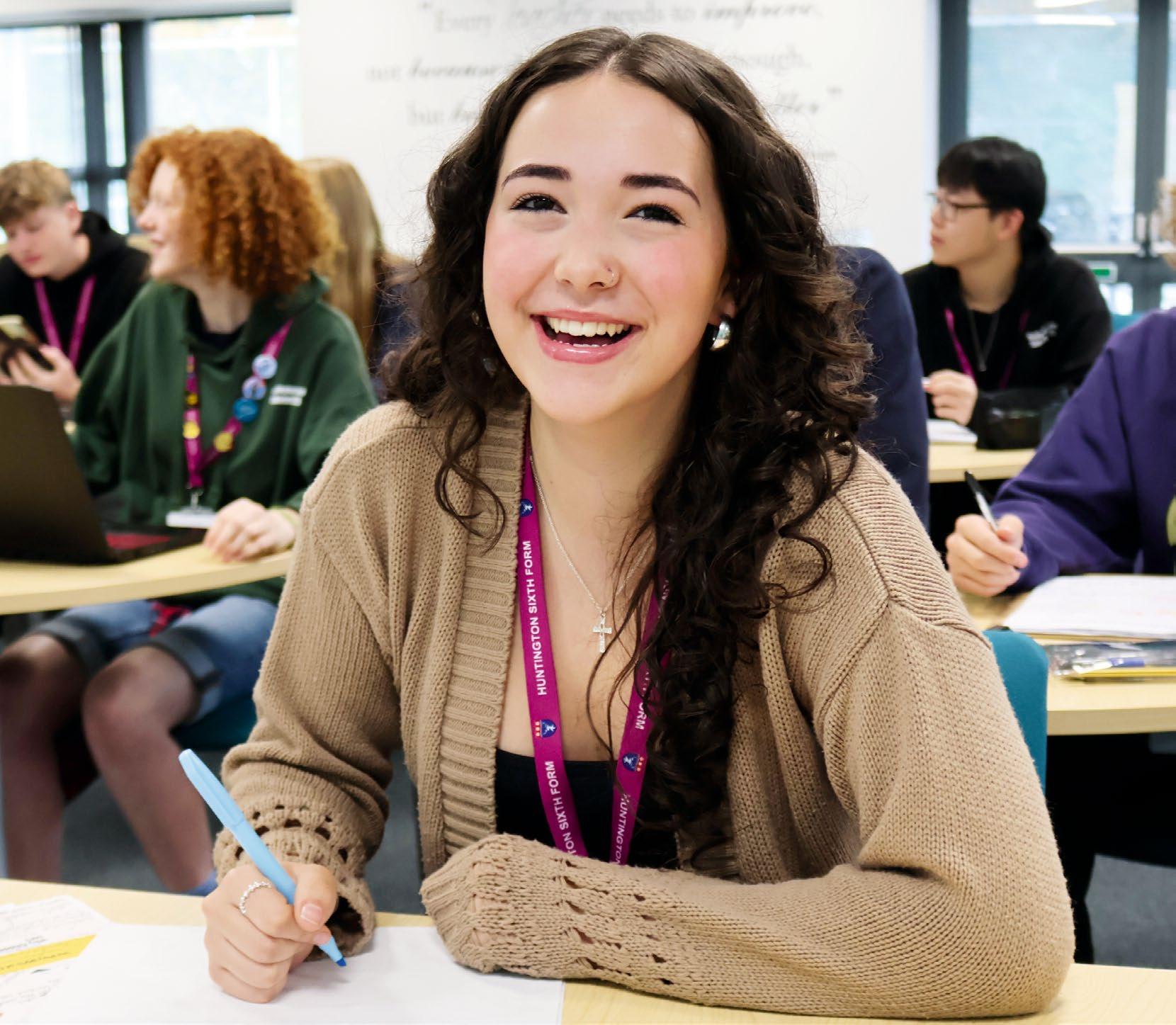

Sixth Form Prospectus

Our school’s core purpose is Learn & Succeed. Everything we do in the Sixth Form seeks to fulfil that purpose.


Our central strength is expert teachers delivering a broad curriculum, pushing students to achieve the best possible results they can.
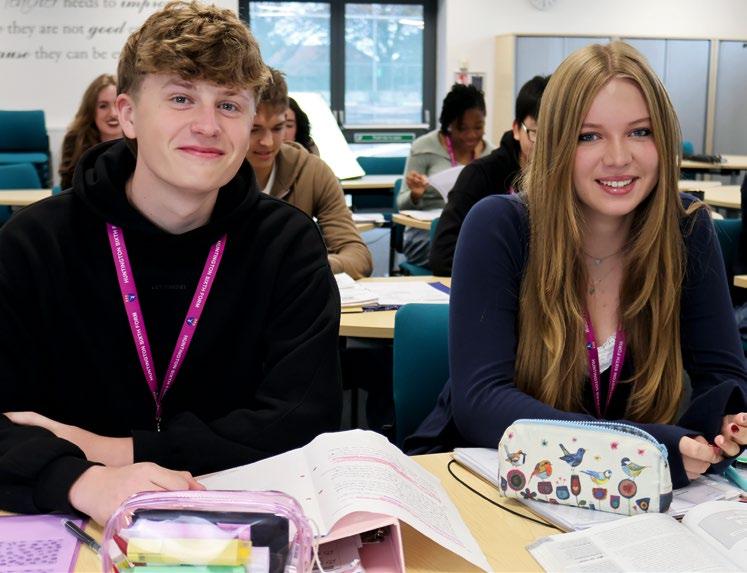
Huntington Sixth Form is a wonderful environment to continue your studies. Alongside academic study we offer wide-ranging extracurricular and personal development opportunities, making Huntington Sixth Form a special place for students to learn and succeed. We expect our students to be highly ambitious for both their Sixth Form life and post-18 aspirations. We then foster the determination needed to achieve those ambitions.
At Huntington, we invest time and energy in supporting our students pastorally in both academic and personal pathways to adulthood. Around a quarter of our Sixth Form join us from other schools, and we work hard to quickly develop a tight-knit, welcoming and sociable community.
Although there is a wealth of information in this prospectus, it will be far better to see it for yourself! Please do come along to one of our taster day events – they will really help you find out if we are the right choice for you.
Hugh Richards Director of Sixth Form
Welcome
Teaching
A track record of teaching excellence
Our expert teaching team routinely deliver inspiring and challenging lessons building students’ knowledge and skills. Our teaching is inclusive and adapted to the needs of different classes and individuals, helping students from all starting points to make exceptional progress. This combination has produced a strong track record of outstanding results for over a decade.
Independent study
The step from GCSE to Sixth Form is challenging. Our teachers help students adapt, ensuring lessons complement carefully planned and purposeful independent study. Students are fully supported with teacher monitoring and feedback as well as excellent study spaces in which to meet this expectation.
Monitoring Progress
One major reason students of all abilities succeed at Huntington is our robust monitoring and tracking systems. In September of Year 12, students receive a minimum target grade based on their GCSE performance. We challenge our students to be in the top 25% of students nationally for progress, a challenge the vast majority meet. Student progress is formally monitored across the two years. Subject teachers, pastoral staff and the students themselves discuss progress at each reporting point, setting small-step targets. We offer a wide range of advice and guidance, actively supporting any student who experiences any difficulty.
34%
achieved an A or an A*, just above our ten-year average – 2025.
SUSTAINED QUALITY:
EXCELLENCE: Consistently in the top nationally for progress over the last ten years, sometimes in the top 10%. 25%
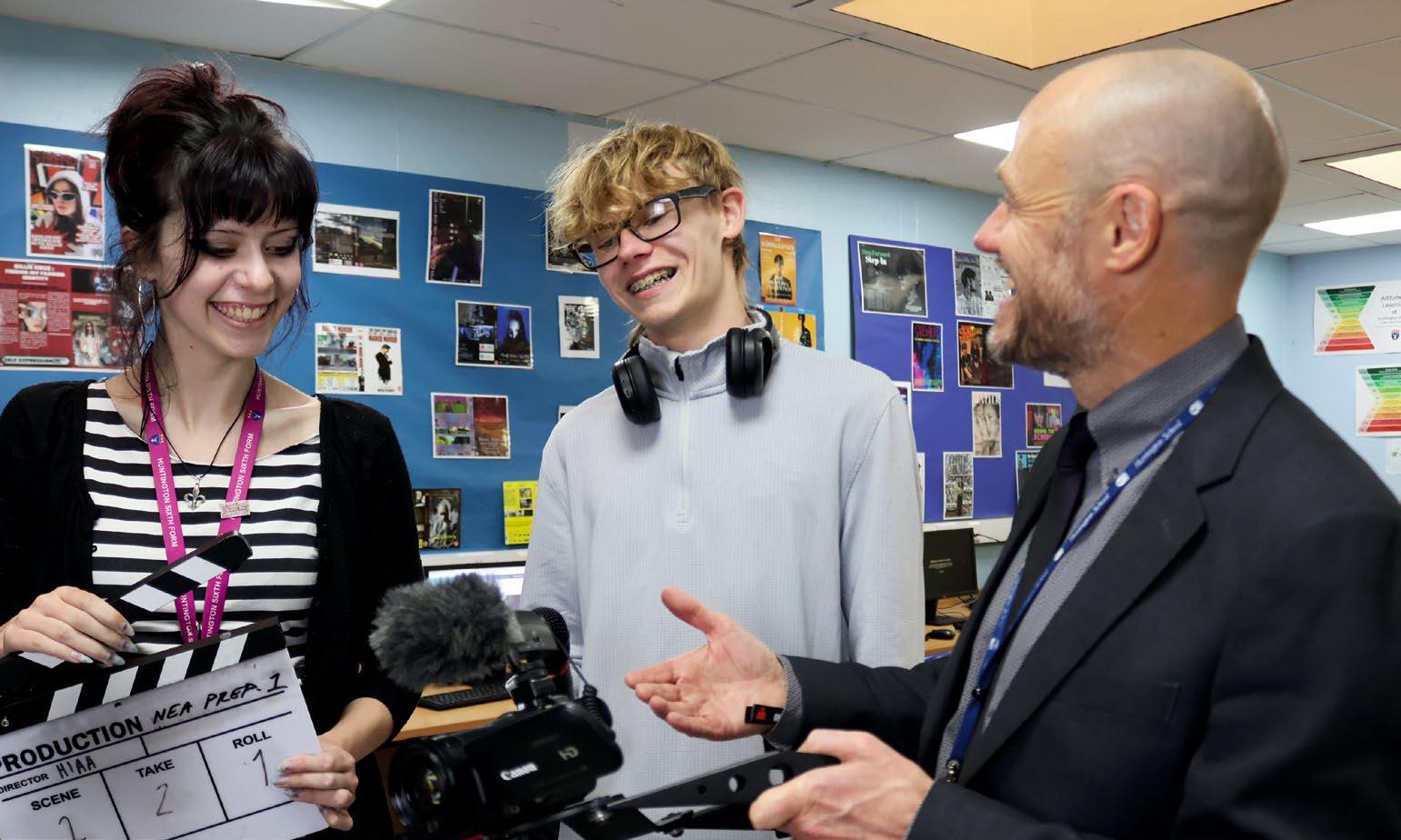
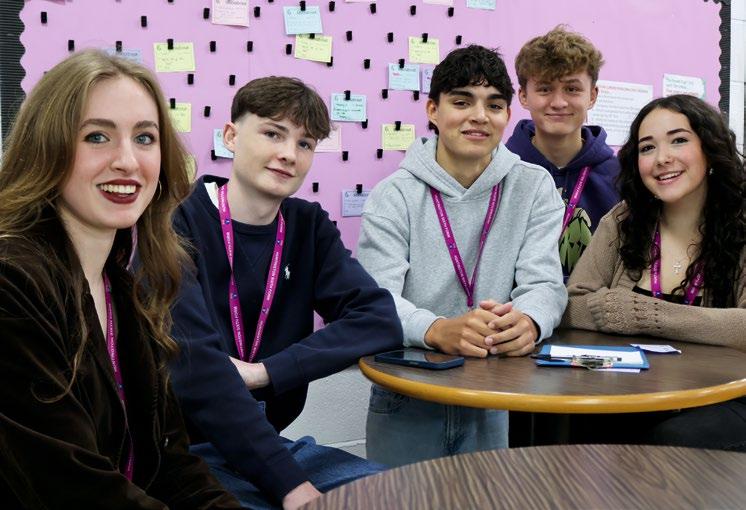
Pastoral care
Our Sixth Form is led by an experienced team of specialist pastoral leaders who have accumulated extensive pastoral experience with this age group. Alongside the Director of Sixth Form and two Heads of Year, we have a dedicated Sixth Form Student Support Leader.
Personalised Tutoring
We use a tutoring system at Huntington Sixth Form blending traditional tutor groups with highly personalised 1:1 support. Two mornings a week, Tutors have sessions with their whole group. The other sessions are used for a rolling cycle of 1:1 Academic Tutor conversations where tailored support is offered and student-specific targets set.
Our Tutors also deliver a tailored PHSE and careers programme to their Tutor group, focussing on issues relevant to our students’ current lives as well as their long-term aspirations and ambitions.
Students from other schools
We work to ensure students joining from other schools are quickly welcomed into our community. We take students on team-building trips, run activities and organize the curriculum breaking down barriers and helping to foster strong connections. Our students quickly organize themselves into bands, clubs, teams, casts and social groups.
Regular communication
As well as regular reporting of attainment grades, effort grades and strategies for improvement, we communicate regularly with parents and carers to keep them in the loop. We use the ClassCharts app to organise students, celebrate successes and highlight any issues, alongside more personalised, direct communication whenever this is helpful.
Pastoral
Hal Petty
The staff that run the sixth form are some of the very best you can get I would say anywhere. They support you all the way through. Settling in has been easy. The most important thing is community, there are trips and events that build friendships and get people talking as people from elsewhere might need that extra hand to find new mates and I already know there’s plenty more like this to come!
Development
The Personal Development Programme
Every Wednesday afternoon, our students are given fantastic opportunities to develop their skills and talents through a range of extra-curricular activities. This is tremendous for mind, body and soul.
Students interact across year groups, building their community and developing essential interpersonal skills. As you can see from the 2025-6 offer listed here, there is a wide range of activities. Every student achieves some form of sustained volunteering or work experience through the Personal Development Programme.
The Personal Development Programme provides each of our students with extra experiences to help them stand out in future applications for work, university or apprenticeships. PDP also contributes to our students’ confidence and wellbeing, challenging them in many unexpected ways!
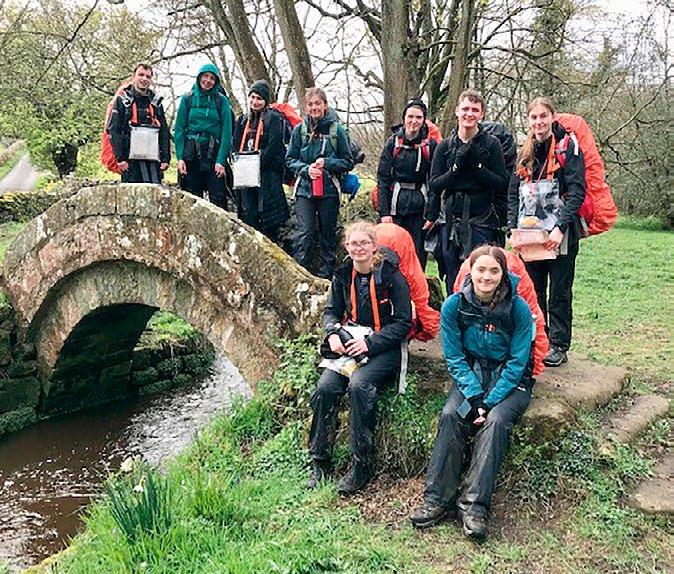
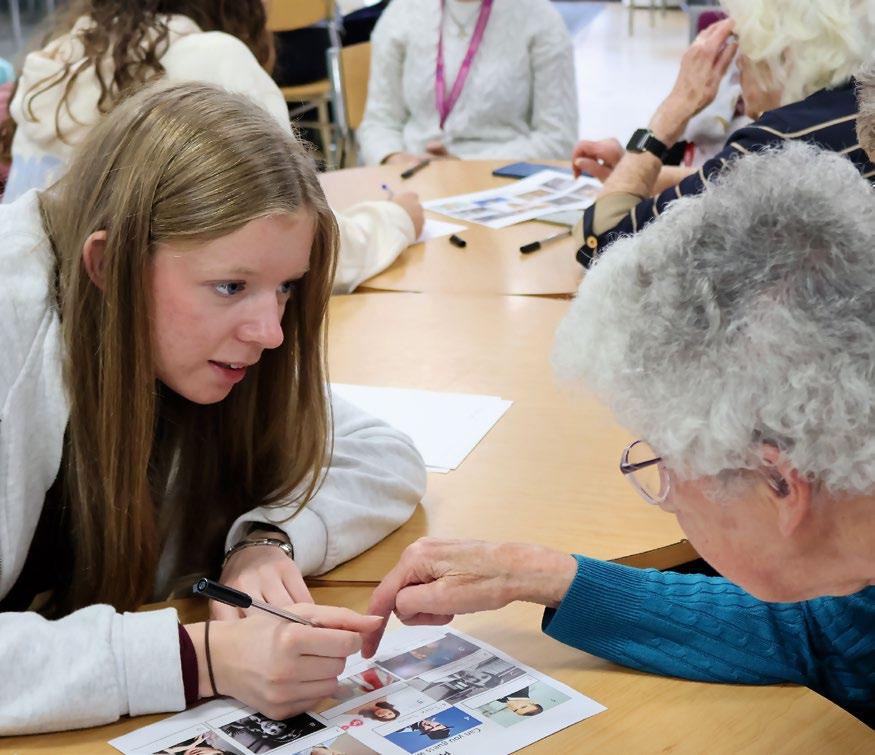
PDP 2025-6
• Learning support with KS3
• Duke of Edinburgh – Silver award
• Sports Leadership Qualification
• Debating
• Student newspaper
• Young teachers
• The “S” project: sustainability
• Masterchef
• Enterprise
• Creative arts
• Panto – Music and Drama
• Activities for all: rare games and sports
• Link Group: engaging with elderly Huntington residents
• Work placement and volunteering
Molly Simister
I continued in to Huntington Sixth Form from the lower school to study English Literature, Sociolinguistics and Drama because I knew there was nowhere else where I would develop such supportive and friendly relationships with my teachers and peers. From the beginning, there’s an ingrained sense of community within Year 12, especially towards students who have joined from another school, and the Sixth Form team work so hard to make the next two years here enjoyable and stimulating for everyone. They provide trips and gatherings that strengthen our bonds to make the year group into a friend group. Students are also constantly provided with new opportunities to add to their CV and develop as well-rounded individuals.
Breadth and Depth
At Huntington, we are always looking for ways to meaningfully improve the opportunities and experiences available to students, developing their understanding of both themselves and the world around them.
Extended Project Qualification
All students are offered the Extended Project Qualification in Year 12, which is taught for two hours a week. The EPQ allows students to carry out research on a topic of their choice that isn’t covered by their courses. They then use this research to produce a written report which is worth half an A-Level.
SSAT Student Leadership Accreditation
We actively encourage all students to engage in meaningful social action projects, fostering a strong sense of civic responsibility and community awareness. Our Sixth Form students take part in dedicated leadership training and play a pivotal role in the life of the school – such as leading the main school student parliament. Through these experiences, students develop essential leadership, communication, and teamwork skills, while gaining a deeper understanding of how they can positively affect others. Every Sixth Form student is supported to achieve the SSAT Student Leadership Accreditation – a nationally recognised award formally acknowledging the leadership skills they’ve acquired. This accreditation enhances future applications and interviews, equipping students with the confidence and experience needed for life after school.
Experiences
Community
As a whole, Huntington Sixth Form is a strong, inclusive community.
We break down the divides between year groups in many different ways, bringing the whole Sixth Form together. However, within this there are smaller groups, built as students participate in bands, pantomimes and shows, play in a team or take a particular subject. These micro-communities are the beating heart of the friendly and welcoming student body and create an experience that is more than the sum of its parts.
Rosie Hartley
I came to Sixth Form after being at Huntington for five years. As someone who struggles with change, I decided staying at this school would be the best decision, but the Sixth Form is a completely different environment to main school, which was unexpected! I was sometimes reluctant to come to school, but instead I am now excited to come to Sixth Form every day, I am enjoying learning to build myself as a person. The teachers treat us more as equals and the conversations I have with staff members feel intellectual and important. The teachers care about their subject, but what makes the lessons so productive and exciting is that the room is full of people who want to be there and are passionate about the subject.
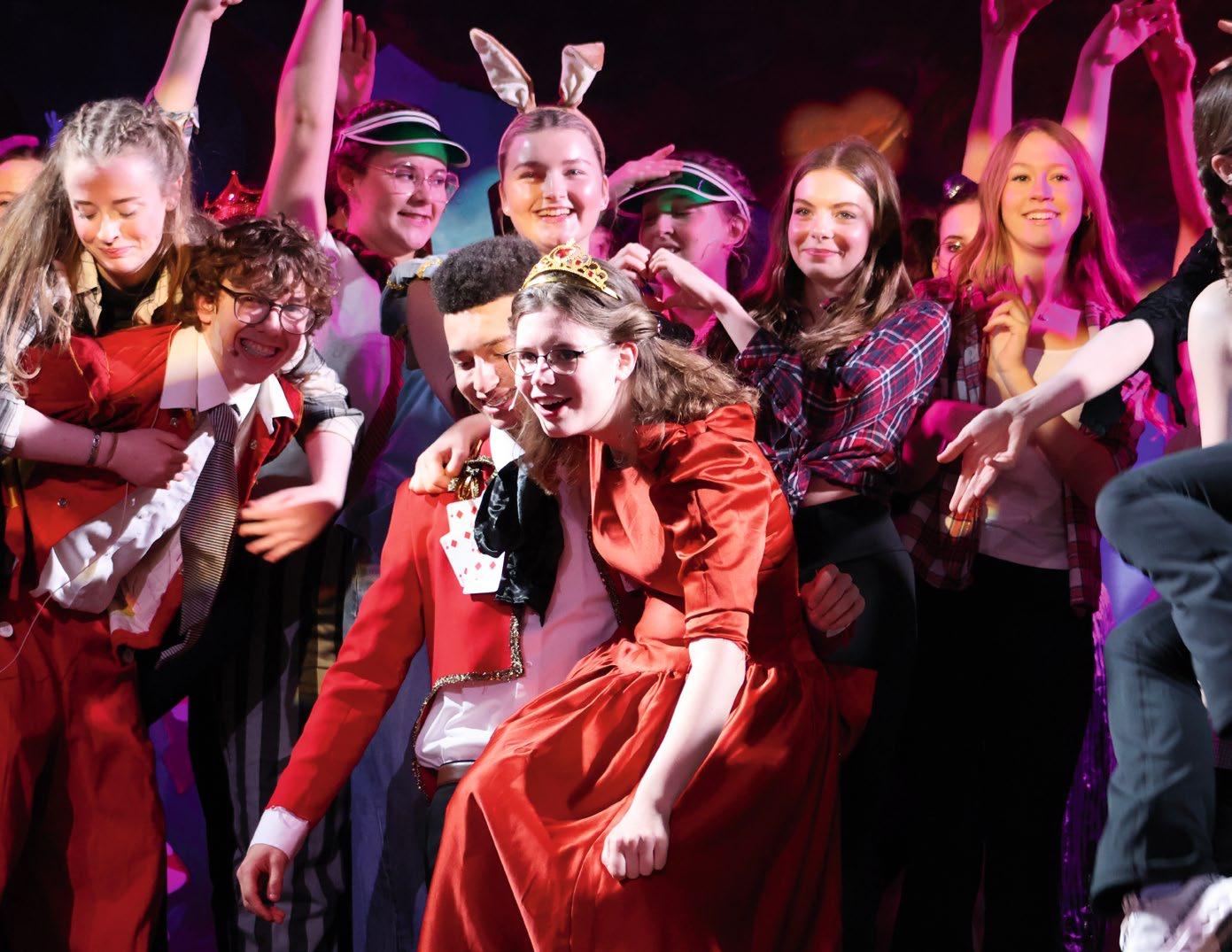
Aris Isbăsoiu
For me, applying to Oxbridge was never something I had even considered. The Sixth Form team pushed me made me realise that not only I have what it takes, but that I have a team which can support me every step of the way. They demystified the process, gave me Oxford-special training for the application process and overall gave me the confidence and ambition to push myself further and further. I would never have been able to do this without their help.
Ambition
Ambition for all: university study, apprenticeships and careers
The majority of our students continue to study at university, and two-thirds progress to Russell Group universities. University study remains a vital pathway into many careers and we pride ourselves on supporting any student who wants to pursue this route, offering the best advice and support we can.
Oxbridge Programme
At Huntington Sixth Form we are ambitious for all our students. For those who want to apply to Oxford and Cambridge we have a highly successful programme in place. Involving individual coaching by staff, bespoke personal statement guidance and interviews with specialists from across the region. Our track record is consistently successful, with 15 students having gone on to study at Oxford or Cambridge in the last four years.
Medicine and Veterinary Medicine
We have a successful programme to support students wishing to apply for highly competitive Medicine and Veterinary Medicine degrees. In 2025, both of our medicine candidates secured places on their preferred courses.
80% OVER
of our applicants received offers from at least 4 of their 5 choices. 50% received offers from all 5 – 2025.
80% OVER of our applicants secured their first-choice course, whilst 16% secured their insurance offer – 2025.
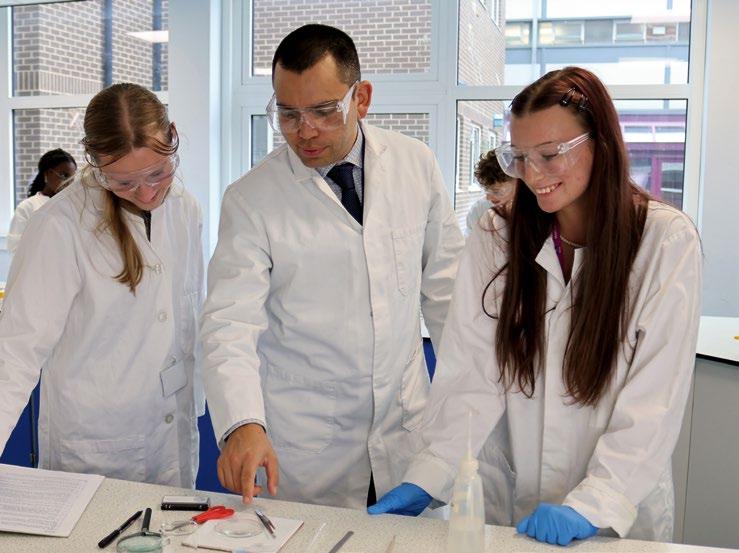
Ambition

Ambition for all: apprenticeships, jobs and other pathways
We are determined to help every Sixth Form student explore their future with confidence – whatever path they choose.
Alongside our successful university application processes, we champion and support those applying for highly competitive apprenticeships and pathways into employment. We recognise that university is not the best pathway for everyone but rather look to advise students based on their own ambitions and aspirations.
Careers and Aspirations at Huntington Sixth Form
At Huntington School, the Aspirations Team is led by Mr Shane Daniel, a qualified Careers Adviser and member of the Career Development Institute, and Miss Kelly Barker, our Work Experience Lead. Mr Daniel and Miss Barker provide high-quality careers education and guidance across all year groups, with a strong focus on Sixth Form.
Personalised and tailored support
Sixth Form students are offered: Personalised careers guidance for all pathways, including university, apprenticeships and employment.
Coordination of work experience, including the Sixth Form PDP Work Placement Option, tailored to students’ career interests.
• Careers education integrated into the PSHE curriculum.
• Year 12 Employability Day, featuring employer-led workshops.
• Bespoke advice available via email, form tutors or a 1:1 appointment.
• Weekly emailed bulletins signposting placements, conferences and resources.
Highly accredited, award-winning provision
Our careers programme follows the Gatsby Benchmarks, the CDI Framework and the CDI Code of Ethics.
• Huntington School holds the Quality in Careers Standard.
Sixth Form Life
Huntington Sixth Form makes full use of the school’s facilities, from sports halls, field and all-weather pitch to newly refurbished science labs and well-equipped textiles and DT workshops. However, there are some areas reserved for the sole use of the Sixth Form, including during study periods.
Dedicated classrooms
Across the school, the Sixth Form use dedicated learning spaces, including social sciences classrooms, the A-Level art studio and soundproofed Music Technology studio.
The ‘Mezz’
The mezzanine on the first floor of the Hub, our library and learning support centre, is dedicated exclusively to Sixth Form private study.
The Common Room
This is the Sixth Formers’ own personal space and is an area run by the Sixth Formers for the Sixth Formers. It is used as study space for group work in lesson time, and is a space for food, drink and relaxing at social times. It has its own coffee shop style café, offering a more adult environment in which to work.
Sixth Form Life
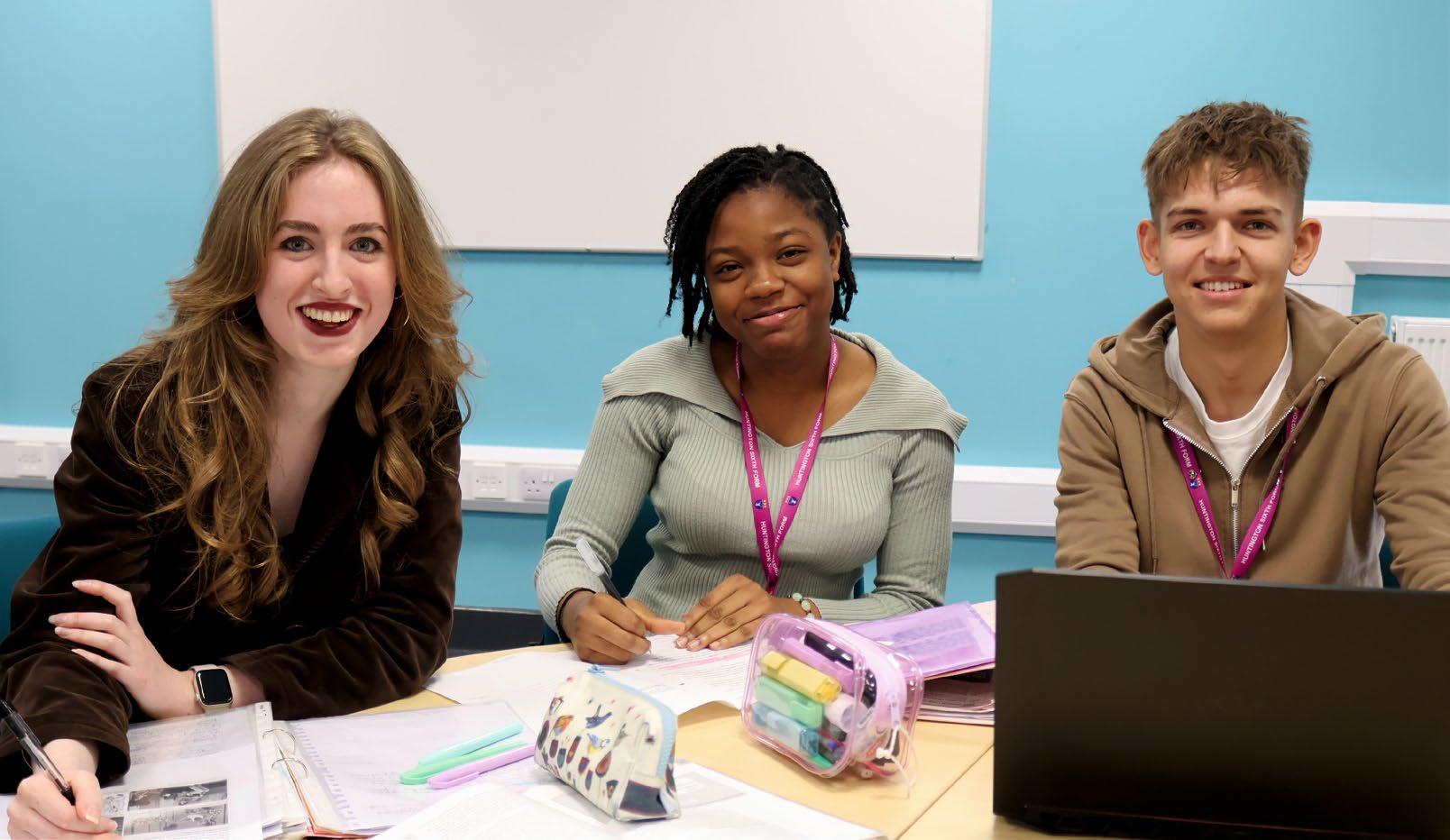

You should select subjects that you think will enjoy and be good at, as this will lead you down a post-18 pathway that you also enjoy!
Choosing courses
At Huntington Sixth Form, we offer a large range of A-Levels and a smaller number of Level 3 Certificates and Diplomas.
What do I need to join Huntington Sixth Form?
There are certain criteria you must fulfil to enter the Sixth Form. The entry criteria we apply are designed to ensure you have the baseline knowledge and skills needed to tackle the demands of Post 16 qualifications. Each subject has its own specific entry criteria which must be met.
Cooperation with The Joseph Rowntree School
As part of our commitment to offer the broadest possible range of courses, Huntington and Joseph Rowntree Sixth Forms have a long-established partnership. We share teaching of four subjects, as identified in the following course pages. Whilst retaining our own distinct identity, we work closely to ensure that the quality of teaching, guidance and support is outstanding in both institutions.
Entry Requirements: overall and subject specific
To secure a place at Huntington Sixth form, you will need 5 GCSEs at grade 9-4, with three of them at a grade 5 or above.
In addition to this baseline, most subjects require specific GCSE grades to ensure you have the knowledge and skills required to access that course. The GCSE Grade profile required by each subject is clearly outlined on each course page.
Students wishing to take 4 subjects will usually need to have an average GCSE grade of 7 or above.
Students joining us from overseas will need to pay a small fee to have their current qualifications certified by the UK Department for Education. More information about this is available on request.
Courses
A-Levels
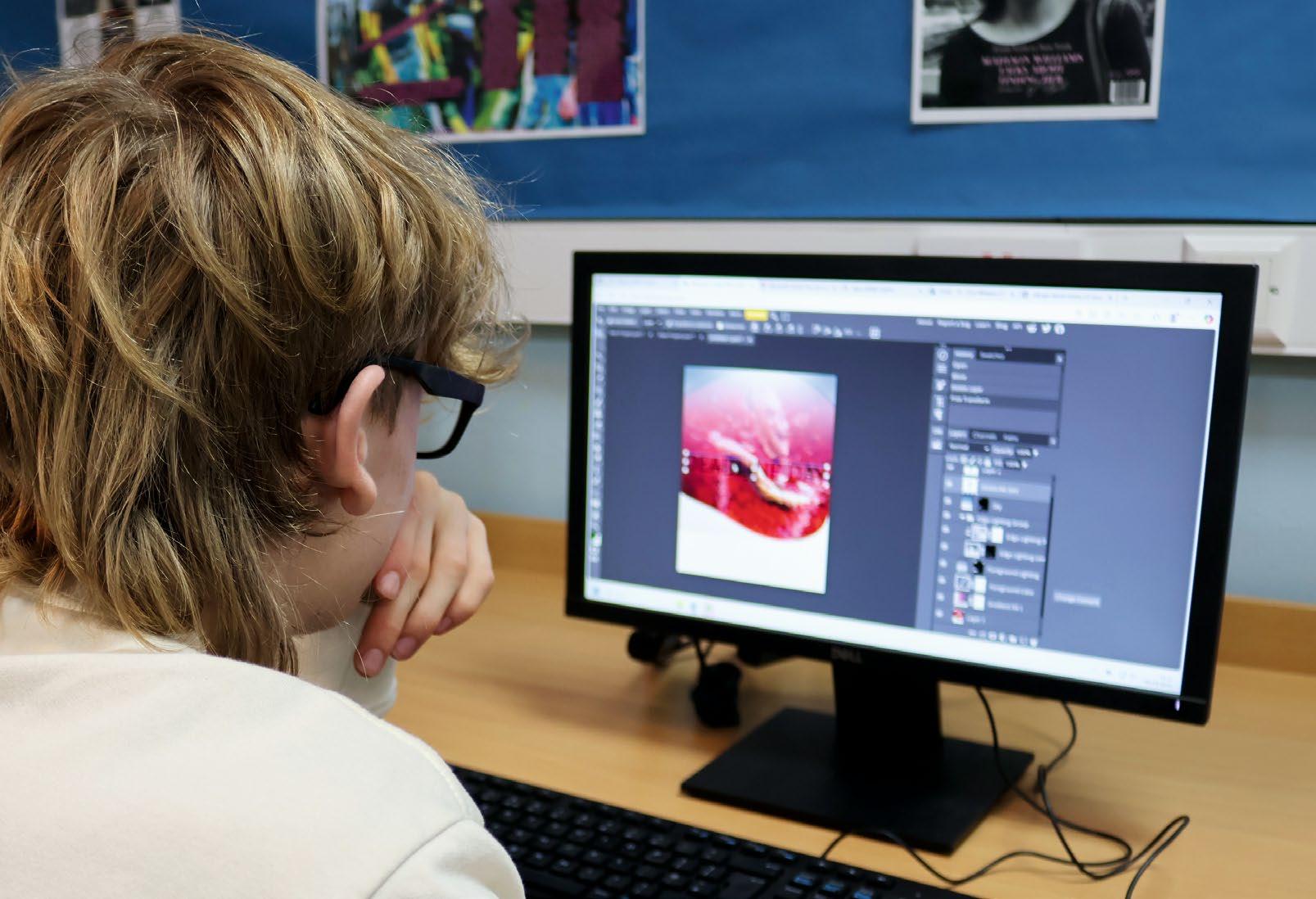

Level 3 Certificates and Diplomas
We offer Level 3 Certificates and Diplomas in a range of subjects. Each Level 3 Certificate is equivalent to an AS-level and each Level 3 Diploma is equivalent to an A-Level. They have significantly more coursework than A-Levels and fewer exams. Each subject is awarded on a Pass, Merit, Distinction and Distinction Plus basis and are accepted by both universities and employers.
Biology
A-Level AQA
Biology at A-Level will enable you to acquire a systematic body of biological knowledge and an appreciation of its significance. It is a subject that can provide you with great enjoyment and respect for all things living. This course develops many of the topics you may have already studied and introduces you to some of the exciting areas of Biology in the contemporary world. You may study, for example, the influence that genes have on our development, environmental issues and aspects of human health. Biology is a practical science subject so you will develop experimental skills and an understanding of the scientific method. It is hoped that this course will help you gain some understanding of the fresh, dynamic and exciting nature of biology today, and an awareness of the ethical, technological and economic aspects of the subject.
Course Content
Year 1 Units
1. Biological molecules
2. Cells
3. Exchange of substances
4. Genetic information
A-Level Units (on top of the Year 1 Units)
5. Energy Systems
6. Responding to Change
7. Environmental Genetics
8. Genetic Control Assessment
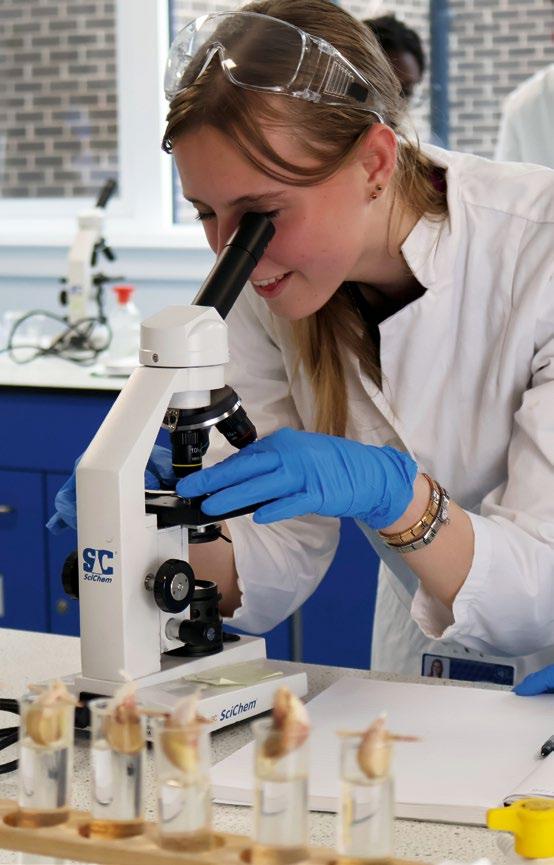
• PAPER 1 (Written exam: 2 hours, 91 marks, 35% of A-Level) Any content from 1-4, including relevant practical skills.
• PAPER 2 (Written exam: 2 hours, 91 marks, 35% of A-Level) Any content from 5-8, including relevant practical skills.
• PAPER 3 (Written exam: 2 hours, 78 marks, 30% of A-Level) Any content from 1-8, including relevant practical skills.
Although the 12 required practicals do not count towards your grade, they are pass or fail, 15% of written the assessment will be based on your knowledge practical skills.
10% of the assessment will require your GCSE Maths skills and higher. Learning the content is only 35-40% of the assessment. Being able to apply that knowledge, in sometimes unfamiliar contexts, is worth 40-45% and being able to analyse and evaluate scientific information is worth 20-25%.
Career Possibilities
An A-Level qualification in Biology could prepare you to study Biology or one of the Biological Sciences in Further or Higher Education. You may wish to take a more vocational course leading to a career in medicine, veterinary medicine, animal health, horticulture or agriculture.
GCSE Grade Profile
Grade 6-6 in GCSE Combined Science OR a grade 6 in GCSE Biology
Grade 5 in GCSE Maths
Grade 5 in GCSE English
A-Level AQA
This is a contemporary course which aims to develop the students’ enthusiasm for Chemistry by exploring its relevance beyond the laboratory. Students will have opportunities to gain hands on practical skills as well as enhance their data handling and problem-solving ability.
Course Content
The three main areas of Chemistry are studied on the course: Physical, Inorganic and Organic Chemistry.
1. Physical Chemistry
This section builds upon some of the key Chemistry concepts studied at GCSE including Atomic Structure, Quantitative Chemistry (Calculations) Bonding and Kinetics (Rates of Reaction). The Energetics of reactions, Chemical Equilibria and Redox Reactions are also covered.
2. Inorganic Chemistry
Involves the study of the Periodic Table, including explaining trends and patterns in physical and chemical properties of the elements and the study of Group VII Halogens and Group II Alkaline Earth Metals.
3. Organic Chemistry
Following an introduction to the principles of Organic Chemistry students study in greater depth the structures, reactions and mechanisms of specific homologous series and functional groups, including alkanes, halogenoalkanes, alkenes and alcohols. We also undertake organic analysis both practically and using spectroscopic techniques.
Assessment
The course is assessed through examination papers:
• PAPER 1
Physical Chemistry, Inorganic Chemistry and relevant practical skills
• PAPER 2
Physical Chemistry, Organic Chemistry and relevant practical skills
• PAPER 3
Any of the content and any of the practical skills
GCSE Grade Profile
Grade 6-6 in GCSE Combined Science
OR a grade 6 in GCSE Chemistry
Grade 6 in GCSE Maths
Grade 5 in GCSE English
Practical Endorsement
There is also a practical endorsement, which assesses the practical skills throughout the entire course.
You will engage in hands-on practical work and investigate projects throughout the 2-year course. The exams assess your understanding of the practical and experimental techniques taught. Your ability to actually, carry out experiments is assessed in a separate qualification called the Practical Endorsement. This is assessed by your teacher based on your performance during practical tasks throughout the course and also based on the work recorded in your lab book over the two years. The practical endorsement is reported on your final A-Level certificate alongside your A-Level grade, as either “Pass” or “Not reported”.
Career Possibilities
The problem solving, numeracy, data handling, analysis, team working, communication and report writing skills gained during A-Level Chemistry open opportunities in a vast range of career areas, both inside and outside the laboratory. Chemistry is vital for medical sciences but can also lead to careers in forensics, engineering, pharmaceuticals, toxicology, law, accountancy, physiotherapy and many other exciting and varied fields of work.

Chemistry
A-Level OCR Computer Science
This course will cover a range of topics such as contemporary system architecture; algorithms and programming. Computer Science is a practical subject where students can apply the academic principles to real-world systems, using computational thinking, helping to develop the skills to solve problems, design systems and understand the power and limits of human and machine intelligence.
Course Content
The course comprises 2 written examinations (40% each) and 1 programming project (20%).
The first unit is based around computer systems and covers a wide range of topics relating to Computer science and linked to ICT in the real world.
These are:
• Systems Architecture
• Memory Storage
• Wired and wireless networks
• Network topologies, protocols and layers
• System security System software
• Ethical, legal, cultural and environmental concerns
The second unit is based around computational thinking, algorithms and programming. This is the theoretical unit that links the knowledge required to complete the practical aspect of the course.
The content of this unit includes: Algorithms
• Programming techniques
• Producing robust programs
• Computational logic Translators and facilities of languages
• Data representation
The third unit of this course is the Non-Exam Assessment the Programming Project. This unit requires the students to complete a programming project independently and covers the key programming principles.
This includes: Programming techniques
• Analysis
• Design
• Development
• Testing and evaluation and conclusions
Career Possibilities
The concepts that are at the heart of this subject would be the best preparation for students who want to go on to study Computer Science at a higher level and will also provide a good grounding for other subject areas that require computational thinking and analytical skills.
GCSE Grade Profile
Grade 5 in Computer Science
Grade 5 in GCSE Maths
Grade 5 in GCSE English
Students will have to show their ability to programme and complete a computation task.
A-Level Pearson
This exciting course offers students the opportunity to study and practically explore a wide range of Theatre history, varied play texts and acting styles. The course will include units focused on Greek Theatre as well as new and exciting contemporary plays. This course requires students to see a wide range of live theatre. They will be given many opportunities to perform to a live audience. The course provides opportunities to develop transferable skills ranging from research, text analysis, essay writing, performance skills, group work, directing, problem solving, leadership skills and organisation of information.
Course Content
• COMPONENT 1: Devising Coursework, 40% of the qualification, 80 marks
This component requires the students to work as part of a group to create an original devised performance. This piece of theatre must be created demonstrating the key elements of a given Theatre Practitioner such as; Bertolt Brecht, Constantine Stanislavski, Mike Leigh, Antonin Artaud.
• COMPONENT 2: Text In Performance Coursework, 20% of the qualification, 60 marks
This component requires a group performance/ design realisation of an extract from a published theatre script. In addition to this scripted performance students must also prepare a monologue or duologue performance/design from a different published theatre script. A visiting examiner assesses the performances.
• COMPONENT 3: Theatre Makers In Practice
Written examination: 2 hours and 30 minutes, 40% of the qualification, 80 marks
The Drama and Theatre written exam is split into 3 sections, A, B and C.

Section A – Live Theatre Evaluation Students are required to write a Live Theatre Evaluation.
Section B – Page to Stage: Realising a Performance Text Students are to answer two extended response questions based on an unseen extract from the performance text ‘That Face’ by Polly Stenham, that they have practically explored.
Section C – Interpreting a Performance Text Students will answer one extended response question from a choice of two based on an unseen section from the studied performance text. The exploration of the text will be practical based, the text currently studied for this component is ‘Lysistrata’ a Greek Comedy by Aristophanes.
Career Possibilities
An advanced level course in Drama and Theatre is good preparation for anyone considering a degree in Drama, Theatre or Acting. It would also equip students with skills needed for qualifications and future careers in; Journalism, Public Relations, Marketing Management, Law, Social Work, Drama Therapy, Hospitality. It provides many transferable skills and academic rigour for Higher Education and the workplace.
GCSE Grade Profile
Five GCSEs at grades 9 – 4
Grade 4 or above in English
It is not a necessity to have studied GCSE Drama.
Drama & Theatre
English Language
A-Level AQA
The English language is not as straightforward as it appears. The language we speak in York is different from the language used in London. Teenagers use different slang from their parents, or younger siblings. Differences in gender, sexuality, ethnicity, social class and occupation all influence the language we use in different ways. This Sociolinguistics course delves into these fascinating issues, exploring how English actually works as a language used by diverse groups of people, for a wide range of purposes, all over the world. We also cover how children first acquire and develop language skills, how the language has changed over time, and how it might continue to change in the future.
Course Content
• Paper 1: Language, the Individual and Society (2 hour and 30 minutes exam)
Analysis and comparison of language used in two different texts, to create meanings and representations
Evaluative essay on Child Language Acquisition, based on a small data sample
• Paper 2: Language Diversity and Change (2 hour and 30 minutes exam)
Evaluative essay on language diversity within the UK, across the globe and across time
Comparison between to texts offering different opinions on language diversity and change
Creative writing task presenting your own opinions on the same topic
• Coursework: Language in Action
Investigation: 2000 word independent research project on an area of your choice, either from the topics studied or your own ideas.
Original Writing: A 750 word original piece of creative writing with the purpose of entertainment, information or persuasion, plus 750 word commentary analysing your work.
GCSE Grade Profile
Five GCSEs at grades 9-4
Grade 6 in English
Grade 5 English accepted in exceptional circumstances with the agreement of the subject leader.
Career Possibilities
The course equips students with transferable skills in textual analysis and comparison, evaluative essay writing, data analysis, critical thinking, independent research, and creative writing. These are crucial skills in a wide range of exciting careers including marketing, PR, copywriting, journalism, speech therapy and teaching.
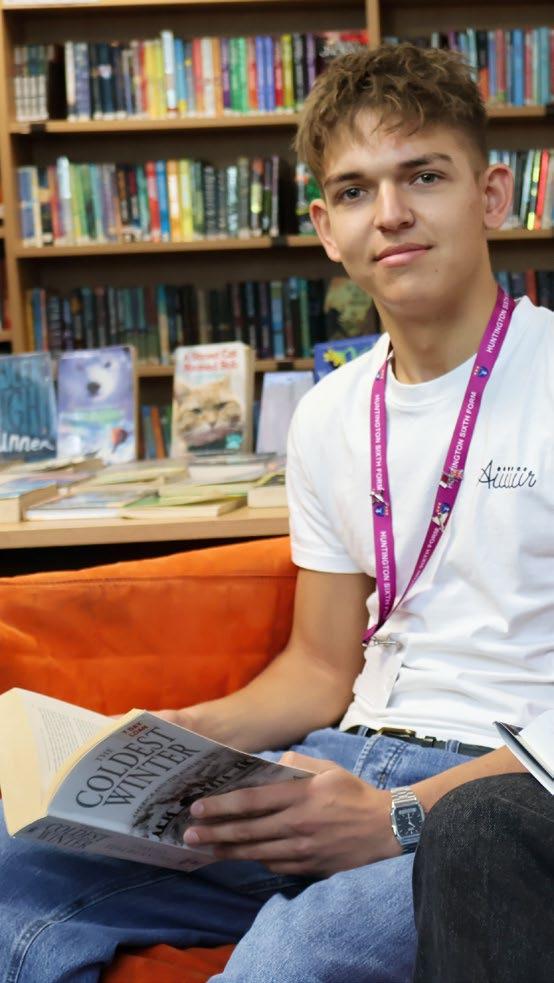
This is a challenging and thought-provoking course that gives students the opportunity to develop their interest in and enjoyment of literature across the centuries. Students will develop their skills of literary analysis, as well as their ability to write in a structured and coherent way, building compelling arguments to explore their own perspectives on the texts they have studied. Students will be encouraged to compare and reflect on texts from a range of forms and genres including poetry, prose and drama, and consider these in relation to critical theories such as Marxism, Feminism and Post-Colonialism. Independent thought, lively discussion and precise analytical writing are all crucial elements of this fascinating A-Level.
Course Content
• PAPER 1: Literary Genres (Aspects of Tragedy) (2 ½ hour exam)
You will study one Shakespeare play, another drama text and one additional text, focusing on authorship and aspects of tragedy. The exam is closed book, with one extract-based question, and one broader thematic question, and a comparison of two texts.
• PAPER 2: Option B: Elements of Political and Social Protest Writing (3 hours)
This unit will involve the study of three texts concerned with oppression and domination in society, including one post-2000 text, one poetry collection and a pre-1900 text. The exam is open-book and comprises one unseen passage, one single text analysis and one comparison.
• NON-EXAM ASSESSMENT: Theory and Independence
This coursework module gives students the opportunity to explore their own literary interests by producing two independent essays on texts of their choice – one poetry and one prose. Each piece of writing will be 1,200-1,500 words in length, and will examine the chosen text in relation to a critical theory such as those mentioned above.
Career Possibilities
An Advanced Level in this subject provides an excellent foundation for a wide variety of university courses, including English Literature, Law, Psychology and Media Studies, and an even larger number of careers in areas such as academia, the media, marketing and teaching.
GCSE Grade Profile
Five GCSEs at grades 9 – 4
Grade 6 in English
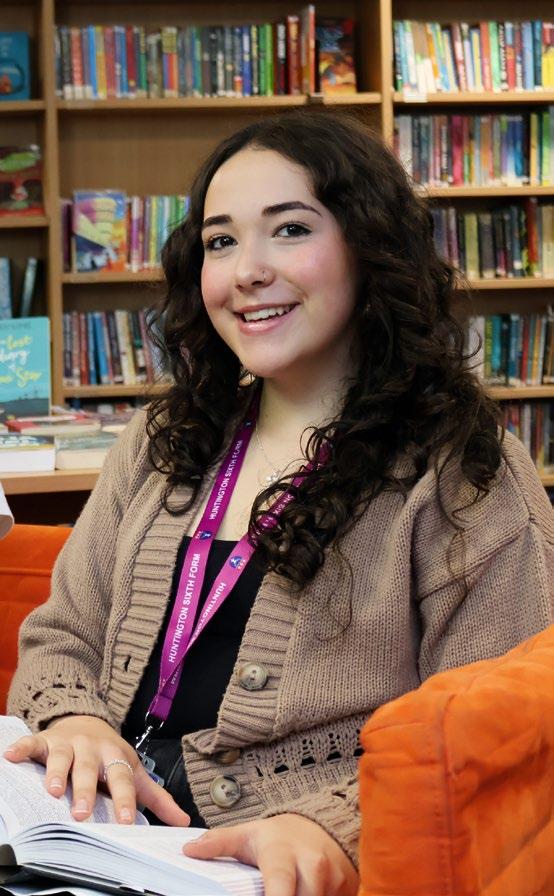
English Literature
Fine Art
A-Level
Art and Design is an exciting subject covering a wide range of media and art experiences. Here at Huntington our Art Department offers A-Level Fine Art which has a strong focus on painting and drawing. Students also work in many areas including digital media, video installation and 3-dimensional design as well as the more traditional drawing and painting in oils and acrylic etc. It truly is a limitless course, where we encourage the students to develop their own ideas and themes, giving them opportunities to create exciting, innovative and diverse work.
Work is project-based, beginning with artist research, experimentation and exploration of materials and developing student ideas, this leads to a wide range of outcomes. Students are trained in concepts and techniques and are expected to show commitment and a real interest in the subject. There is the opportunity to visit galleries to reinforce and stimulate students’ own work.
We are incredibly lucky to have our own dedicated sixth form art studio space, allowing students to work in their own time. Our studio is a welcoming space where students can keep up to date with contemporary art news on the iPads and enjoy tea or coffee from our refreshments area.
Course Content
COMPONENT 1: Portfolio
Coursework consists of two elements: practical, skill building and a personal investigation. This A-Level is coursework based, known as Non-Examined Assessment (NEA).
We begin the course developing students skills in lots of areas of Fine Art, exploring the possibilities of materials. Students look at artists to develop their own interest before deciding on a personal theme. In the practical element students pursue their own creative ideas in a chosen area of art that holds a special interest for them, which must be linked to the personal investigation. In the personal investigation the student researches and establishes sustainable links between their own work and that of other artists whilst fully exploring their own creative capabilities and communicating visually their journey. It usually takes the form of a study in a sketchbook with a written text of between 1,000 and 3,000 words. This is worth 60% of the grade.
COMPONENT 2: Externally Set Assignment
A theme is set by the exam board and students utilise skills and ideas developed in component 1 to produce a portfolio of evidence. This is completed in the spring term of Year 13, with the majority of the portfolio completed in normal lesson time. The final response(s) is completed under examination conditions. This is worth 40% of the grade.
Career Possibilities
Art A-Level is an important qualification in any area of employment that requires a creative mind. Art will develop visual skills, critical thinking; it values curiosity, enquiry, resilience and independent thinking. Learning through making encourages imaginative thinking and interpretation through experimentation and analysis. This style of learning develops an ability to think about problems from a broad perspective. It is necessary for entry onto an art Foundation Course, a prerequisite for most university art courses, and is recognised by universities as an academic Advanced Level for entry into a wide range of courses in non art-based subjects.
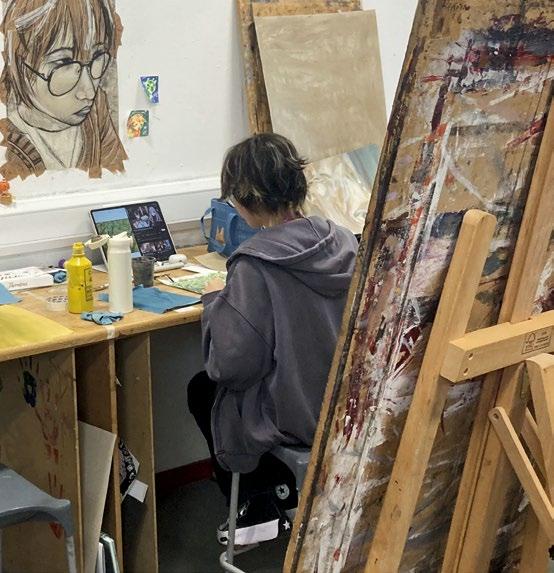
GCSE Grade Profile
Five GCSEs at grades 9 – 4
Grade 5 in Art and Design
A-Level Pearson
This is a stimulating and challenging course which aims to develop the student’s love of the French language by using it to discuss aspects of modern day society and by analysing its grammar in greater depth than is possible at GCSE level. The skills assessed are the familiar ones of listening, speaking, reading and writing but lessons emphasise discussion and the development of students’ views and opinions. In addition to classroom lessons, students also have access to the French Assistant, and we have set up a sixth-form exchange programme with a partner school in Dijon, York’s twin city, to allow students to be fully immersed in French life.
Course Content
Students study various aspects of society, culture and history in French-speaking countries. These are grouped into four main themes. Changes in French society
• Political and artistic culture in Frenchspeaking countries
• Immigration and multicultural French society
• The Occupation and Resistance
In addition students will study a French film in year 12 and a literary text in year 13.
At the end of year 13 students will be assessed on all aspects of the course by means of the following exams.
• Unit 1: Listening, Reading and Translation (2 hour exam)
Students will be assessed in these skills across all of the four main themes studied over the two year course. They will also be tested on their ability to translate from French into English.
• Unit 2: Writing and Translation (2 hour 40 minute exam)
Students will be assessed on their ability to criticise and analyse the film and book they have studied, and also to translate into French.
• Unit 3: Speaking (20 minute exam)
Students’ speaking abilities are assessed through discussion of their individual research project and one of the themes from unit 1.
GCSE Grade Profile
Five GCSEs at grades 9-5
Grade 6 in French
French
Career Possibilities
Foreign language skills are much sought after in the work place and French is an official working language of many international organisations: the UN, EU, IOC, FIFA, Médecins Sans Frontières, to name just a few, quite apart from the many companies headquartered in France.
At university French can be studied either in combination with another language or with almost any other subject and leads to careers in sales, marketing, business, journalism, engineering, the civil service – in fact, in just about anything!
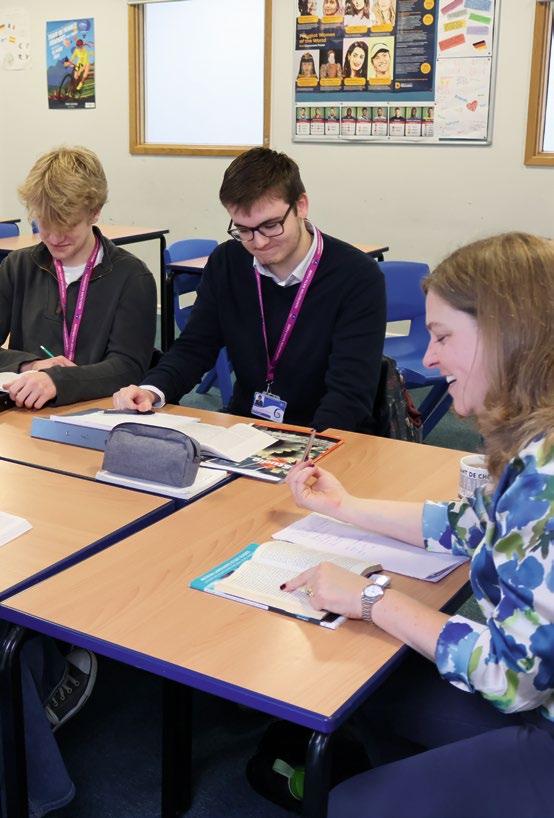
Further Mathematics
A-Level Pearson
Further mathematics is a challenging and fascinating course which allows students to study the subject in much greater depth and arrive at a more profound understanding of the connectedness of different areas of mathematics.
Course Content
Further Core Pure Mathematics
The course introduces students to a new number system: the complex numbers, which contains not only the answer to “what number, z, has the property that z^2=-9?”, but also poses many new and interesting questions in which geometrical skills can be applied to shed light on algebraic problems. Students will learn to use matrices both to solve simultaneous equations and to explore transformations of points and shapes on the plane, and they will learn much more about using vectors to describe objects than that encountered at GCSE level. The calculus which they encounter in their A-Level mathematics course is extended and developed so that they are able to solve a much greater number of problems, including finding solutions to equations which involve rates of change. Students will learn to describe points in space using not only (x, y) coordinates but using polar coordinates, through doing so encountering a much wider array of interesting graphs and functions.
Decision Mathematics
Students learn about the mathematics which underpins computer science: algorithms, critical path analysis, graph theory and linear programming. All of these will be brand new topics not encountered at GCSE level.
Option
Depending on the group/teacher, students will study one of four possible courses which will either contain more pure mathematics, statistics, mechanics or decision mathematics.
Assessment
Students sit four 90 minute papers at the end of year 13: two in pure mathematics, one in decision mathematics, and one in their other optional paper.
Career Possibilities
Most students who choose Further Mathematics choose it because they enjoy mathematics. Those who want to study mathematics, physics or computer science at university will benefit greatly from successfully completing the A-Level in Further Mathematics. The course challenges students to reason carefully and critically in ways which are beneficial to many other possible study and career paths, and as such a highly regarded qualification it can add weight to applications for all sorts of jobs or university courses.
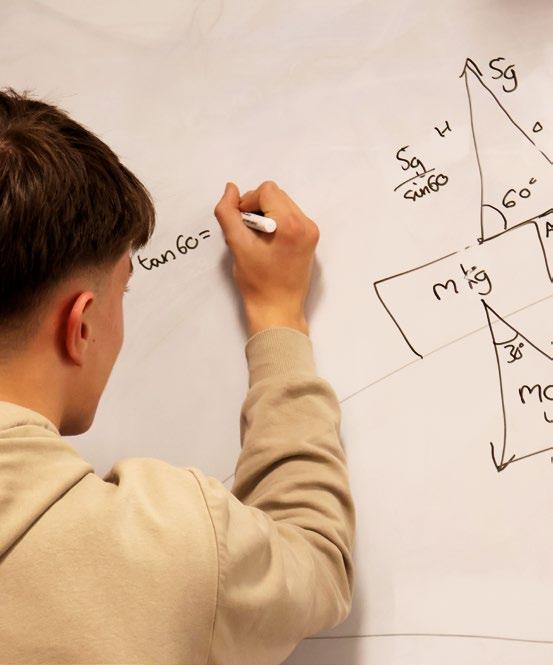
GCSE Grade Profile
Five GCSEs at grades 9-4
Grade 7 in GCSE Maths, preferably 8 or 9
Please note, Further Mathematics is taught at the Joseph Rowntree School.
A-Level AQA
This is a new course fit for the 21st Century and is a must for anyone who is interested in the present and future state of our planet and its inhabitants. Students will build on the knowledge; understanding and expertise gained at GCSE and will investigate the challenges of the natural world and today’s modern society. The course has a balance between physical, human and environmental topics with fieldwork and research skills a key feature. Students will develop their decision-making and analytical skills both as an individual and in groups. In addition to classroom lessons students will plan and undertake fieldwork days locally and nationally and will have an opportunity to take part in a European visit.
Course Content
• Component 1: Physical geography (2 hours 30 exam)
Section A – Water and carbon cycles
Section B – Coastal landforms and landscapes
Section C – Hazards
• Component 2: Human geography (2 hours 30 exam)
Section A – Global systems and global governance
Section B – Changing places
Section C – Contemporary environments
• Component 3: 3,000 – 4,000 word individual investigation based on fieldwork data.
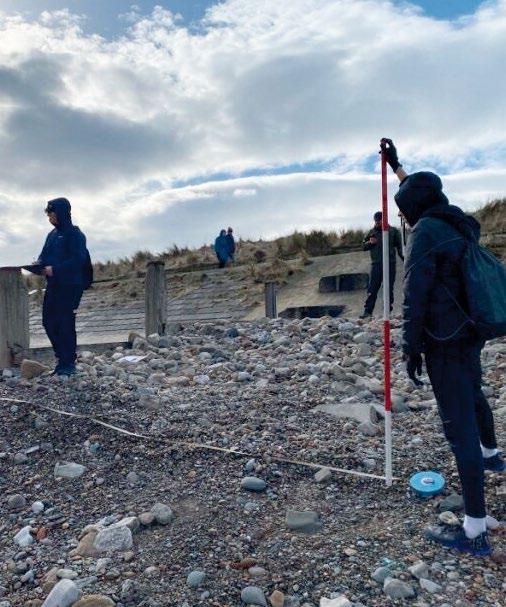
Career Possibilities
An Advanced Level in Geography provides a broad and balanced education and develops a wide range of skills. It can therefore lead onto Humanities or Science-based degree courses, as well as specialist courses in Geography and Environmental studies. The career paths of Geography students are as varied as the subject itself, Geographers are great decision-makers and problem solvers; and jobs include crime analysts, town and country planning, civil service, travel and tourism, business management, marketing, environmental agencies, development agencies and careers on the airlines. It is also one of the degree courses with the highest employment percentage after graduation.
Geography
GCSE Grade Profile
Five GCSEs at grades 9-4
Grade 4 in Geography
Grade 5 in Maths
German
This is a stimulating and challenging course which aims to develop the student’s love of the German language by using it to discuss aspects of modern day society and by analysing its grammar in greater depth than is possible at GCSE level. The skills assessed are the familiar ones of listening, speaking, reading and writing but lessons emphasise discussion and the development of students’ views and opinions. In addition to classroom lessons, students also have access to the German Assistant, and participate in a long-standing exchange programme with a school in Bardel, which also incorporates a work experience placement.
Course Content
Students study various aspects of society, culture and history in German-speaking countries. These are grouped into four main themes.
• Aspects of German society
• Political and artistic culture in German-speaking countries
• Immigration and the multicultural German society
• The Reunification of Germany
In addition students will study a German film in year 12 and a literary text in year 13.
At the end of year 13 students will be assessed on all aspects of the course by means of the following exams.
• UNIT 1: Listening, Reading and Translation (2 hour exam)
Students will be assessed in these skills across all of the four main themes studied over the two year course. They will also be tested on their ability to translate from German into English.
• UNIT 2: Writing and Translation (2 hour 40 minute exam)
Students will be assessed on their ability to criticise and analyse the film and book they have studied, and also to translate into German.
• UNIT 3: Speaking (20 minute exam)
Students’ speaking abilities are assessed through discussion of their individual research project and one of the themes from unit 1.
GCSE Grade Profile
Five GCSEs at grades 9-5 Grade 6 in German
Career Possibilities
German is the most in-demand additional language for employment in the UK, and an A-Level in German is good preparation for any student entering university or employment, by extending communication skills and a wide range of socio-cultural knowledge.
At university German can be studied either in combination with another language or with almost any other subject and leads to careers in sales, marketing, business, journalism, engineering, the civil service – in fact, in just about anything!
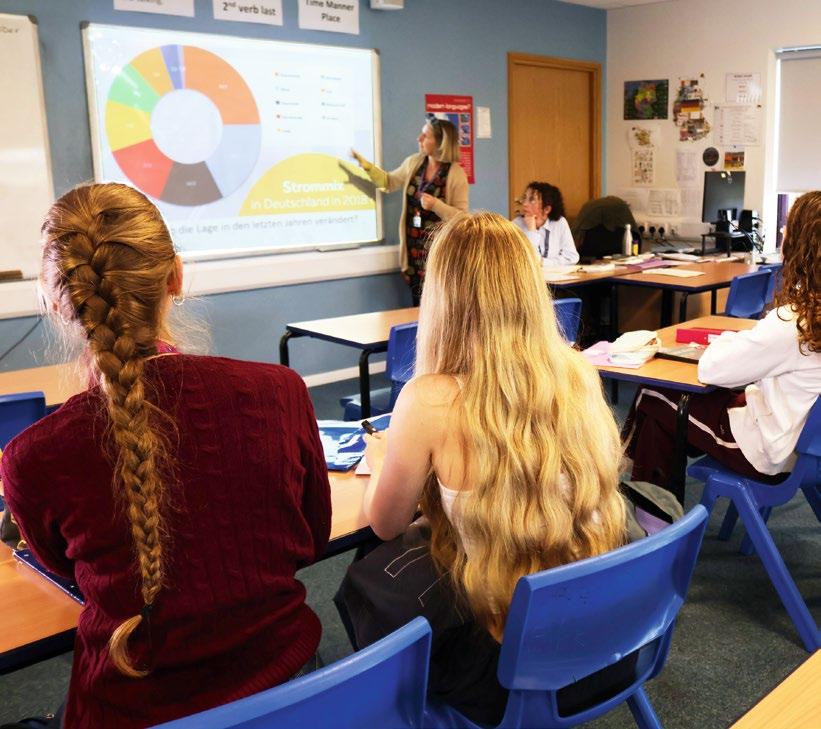
A-Level OCR
This is a fascinating and challenging course which offers students the opportunity to study British and World History in both depth and breadth. The course includes units focused on Early Modern British history, as well as 19th and 20th Century American and worldwide studies. The course provides opportunities to develop academic skills ranging from research, document analysis, essay writing to questioning skills, critical thinking and organisation of information. The Personal Study unit allows students to demonstrate a greater degree of flair and independence with in-depth research and analysis of a particular historical topic.
Course Content
• UNIT 1: Early-Mid Tudors, 1485-1558 (1 hour 30 minutes written exam)
How effectively did the Tudors establish and consolidate their monarchy?
This unit provides an overview of developments in England 1485-1558. It focuses on the growth of political stability under the Tudors from the unstable legacy of the Wars of the Roses and Richard III. The key developments of Henry VII’s reign will be studied before considering the turbulent and dramatic events of the reign of Henry VIII. Finally, we examine the so-called ‘Mid-Tudor Crisis’ during the reigns of the boy king Edward VI and the religiously-driven Mary.
• UNIT 2: The Cold War in Asia, 1945-1993 (1 hour written exam)
This unit will consider the policies of Western nations in Post-War Asia. Particular attention will be given to the Korean War – causes, events, impact on public opinion and outcomes. US actions in Vietnam and Cambodia and the SouthEast Asian region as a whole will also be studied in-depth. The course allows consideration of these events from a range of perspectives and questioning traditional interpretations, exploring histories beyond the Western world.
• UNIT 3: Civil Rights in America, 1865-1992 (1 hour 30 minutes written exam)
This thematic study focuses on the struggle of citizens in the United States to get equality before the law and within society. Students will learn about the factors that progressed and regressed the extent of civil rights during this period. The struggle for civil rights will concentrate on the triumphs and plights of four specific groups: African Americans, Trade Union and Labour rights, Native American Indians and women. It will broaden the traditional study of American Civil Rights, putting the famous events of the 1950s and 1960s into a wider, richer context.
• UNIT 4: Historical Enquiry/Personal Study
Students will submit a Historical Enquiry based on the investigation of a historical issue of their choice. They will normally choose to deepen their understanding of an area of particular interest from Units 1 or 2. This enables them to start their enquiries from existing knowledge and simultaneously build transferable expertise for one of the examined units.
Career Possibilities
An advanced level course in History is good preparation for anyone considering a degree in History, Politics, Law, Journalism and Social Studies. It provides transferable skills and academic rigour for Higher Education and the workplace.

GCSE Grade Profile
Five GCSEs at grades 9-4
Grade 5 in History
Grade 5 in English
Students who have not studied GCSE History but are interested in A-Level should talk to the Subject Leader. They will need a strong English grade to indicate their suitability for the course.
History
Mathematics
A-Level Pearson
The A-Level mathematics course builds from GCSE level mathematics and introduces calculus and its applications. It emphasises how mathematical ideas are interconnected and how mathematics can be applied to model situations using algebra and other representations, to help make sense of data, to understand the physical world and to solve problems in a variety of contexts, including social sciences and business. All students will be assessed on their knowledge of Pure Mathematics, Mechanics and Statistics.
Course Content
Pure Mathematics
Students will build on skills from GCSE including those involving surds, indices, quadratic equations, algebraic inequalities and graphical representations. They will learn to use differentiation and integration in various contexts, extend their knowledge of trigonometry, and work with sequences, functions and binomial expansions.
Statistics
There is a focus on exploring data as well as learning about probability distributions (normal, binomial and discrete distributions). The language of hypothesis testing is introduced to give students a fascinating insight into how statistics can help reach informed conclusions about questions such as whether a medicine is effective or a jury biased.
Mechanics
Mechanics looks at an elegantly simple mathematical model for physical situations: for example, how high does a cannon ball reach if it is fired at a certain angle at a given velocity? How much brake power must be applied to stop a runaway train? The course covers the equations of motion for systems involving constant acceleration as well as applying Newton’s laws in basic situations.
Assessment
Students will sit two 2 hour papers in pure mathematics and one 2 hour paper covering the mechanics and statistics content. The specification followed and examining body is Pearson Edexcel.
Career Possibilities
An advanced level course in Mathematics is good preparation for anyone considering a degree in Mathematics, Engineering, Accountancy, Medicine and many more. Mathematics is also a challenging and stimulating subject to study in its own right, opening the door to many careers after completing Higher Education. It is a useful qualification for entry into career areas such as air traffic control, banking, insurance, science of all types and the armed forces.
GCSE Grade Profile
Five GCSEs at grades 9-4
Grade 7 Maths
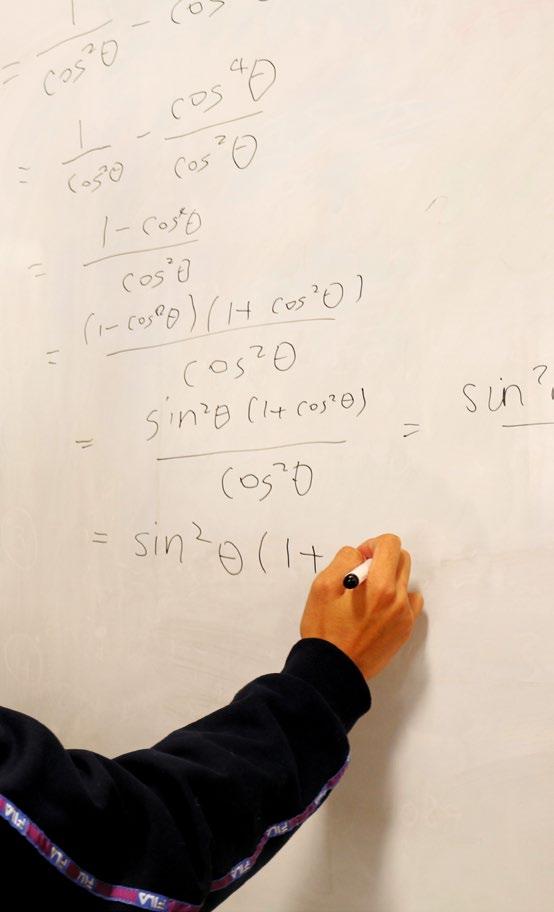
A-Level WJEC
Through studying Media Studies, students will view, evaluate and analyse a variety of media products, and develop practical skills spanning a range of media forms. You’ll find contemporary, diverse topics and varied and engaging content, helping students to develop research, problem-solving skills as well as their creativity. They’ll also refine their debating skills through the discussion of contemporary issues from a range of perspectives.
Course Content
• COMPONENT 1: Media Products, Industries and Audiences
Written examination – 2 hours 15 minutes (35% of qualification)
In this component, learners will develop knowledge and understanding of key aspects of the theoretical framework – media language and representation – as an essential basis for analysing media products from a variety of forms. In addition, learners will study products from specific media industries and for specific audiences to develop their knowledge and understanding of those areas of the theoretical framework.
Learners will also explore how media products relate to their social, cultural, historical, political and economic contexts. In this component, learners will also develop their ability to use relevant subject-specific terminology and theories.
• COMPONENT 2: Media Forms and Products in Depth
Written examination – 2 hours 30 minutes (35% of qualification)
In this component learners are required to study three media forms in depth, exploring all areas of the theoretical framework – media language, representation, media industries, and audiences –in relation to audio-visual, print and online products set by the exam board. The forms to be studied in depth are: ‘television’, ‘magazines’, ‘blogs and websites’. Learners will explore these three media forms through close analysis of the set products, comparing their use of media language and the representations they offer in relation to relevant social, cultural, economic, political and historical contexts.
GCSE Grade Profile
Five GCSEs at grades 9-4
Grade 5 in English
Grade 5 in another essay writing subject
• COMPONENT 3: (NEA: coursework)
Cross-Media Production
Non-exam assessment – internally assessed (30% of qualification)
This component synthesises knowledge and understanding of the media theoretical framework gained throughout their course by requiring learners to apply their knowledge and understanding of the media synoptically to a practical production. The production must be based on two media forms and completed in response to a choice of briefs set by the exam board.
Career Possibilities
An A-Level in Media Studies is not your passport to a job in this field of work. However, media employers do look encouragingly at a student who can demonstrate an understanding of how the media operates. The Media industry is one of the fastest growing sectors in the world and university courses reflect employer’s demands for crucial skills in this discipline. Past Media students have enjoyed success across all aspects of the Media and related industries. Former students have commented upon the usefulness of the range of transferable skills that studying the Media has given them.
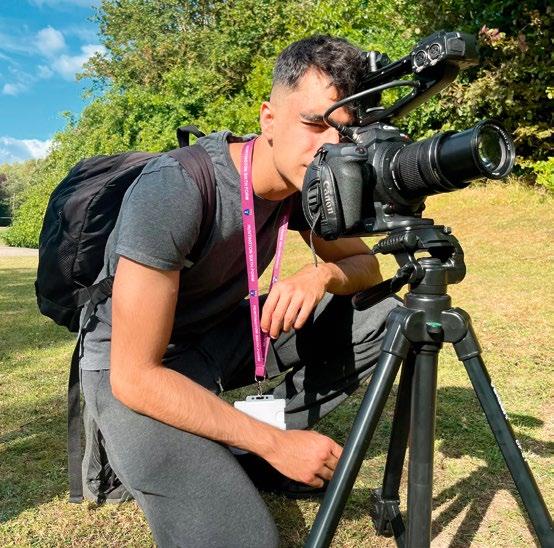
Media Studies
Music
A-Level AQA
We offer the AQA A-Level course at Huntington. The course provides students with the opportunity to really understand how music works, both through making it and analysing it. This is a course for those who enjoy the creative freedom of composition, the dedication and commitment needed for performance and the intellectual rigour of research and analysis. The course encompasses a range of musical styles and traditions from 1650 to the present day.
Course Content
• COMPONENT 1: Appraising Music (40%) Assessed through a 2hr 30 minute exam
Students will study the compulsory area of study – the Western Classical Tradition (1650-1910) with a particular focus on the Baroque Solo Concerto, Operas of Mozart and Piano music of Brahms, Chopin and Grieg.
We will also explore two further areas of study from the optional list: Pop Music and Music for Media.
Students learn to appraise, develop and demonstrate an in-depth knowledge and understanding of musical elements, contexts and associated language. The exam assesses students’ understanding through a combination of short, extended and essay answers as well as notation-based responses.
• COMPONENT 2: Performance (35%)
In this component, students can perform in any style as a solo instrumentalist, vocalist, as part of an ensemble or via music production. Students will be advised on repertoire choices and coaching will be offered during the two years of the course. Performance work must last for a minimum of 10 minutes. This can be in any combination of playing, singing, ensemble and production via technology. The 10 minute performance time can be made up of several pieces which can be recorded separately.
• COMPONENT 3: Composition (25%) Assessed through a minimum of 4½ minutes of music
Students will write 1 original (free) composition and 1 composition to a brief. The composition to a brief can either be the 4-part harmonisation of chorales in the style of Bach (a skill all students will explore during the course), or an additional original composition in response to briefs provided by the exam board.
Career Possibilities
A-Level music is good preparation for anyone considering a degree in the subject, but it also provides the academic rigour needed for higher education in any field. Former students have gone on to pursue a wide range of careers including engineering, medicine and politics as well as music related careers.
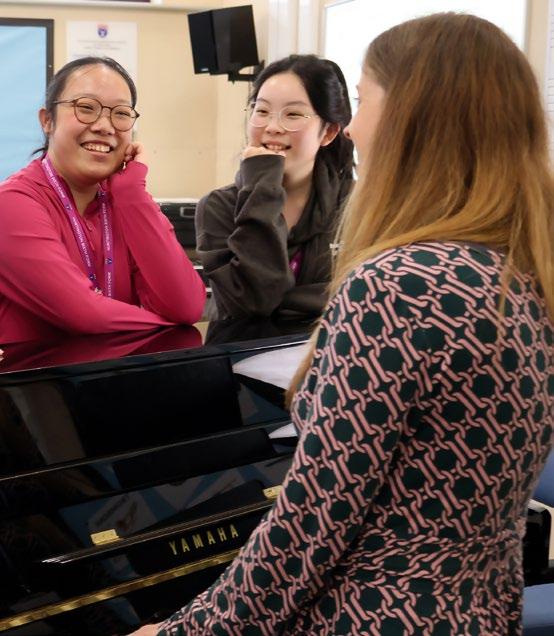
GCSE Grade Profile
Five GCSEs at grades 9-4
Grade 5 in Music
We also recommend that students have the equivalent of Grade V on either a voice or instrument.
This course is ideal for students interested in how music and sound are recorded, manipulated, and produced. You will practical skills in creating original music within a studio environment, as well as capturing and processing both live and synthesized instruments. Alongside hands-on experience, you will build a strong theoretical understanding of sound, audio production, and recording technology, demonstrated through analysis, critical thinking, and effective organisation of information. The course also helps you develop valuable transferable skills, including project and people management, critical assessment, working to a brief, and nurturing creativity and imagination.
Course Content
• UNIT 1: Recording (Coursework, 20% of the qualification)
Students will learn how to make high quality recordings using studio facilities at Huntington. They will be taught how to capture, edit, process and mix audio on industry standard software. The chosen track will be from a list of 10 artists provided by the exam board. The student will take on the role of ‘producer’ and as such there is no requirement to perform any of the parts (suitable musicians will be identified); however, there are ample opportunities to perform for those that wish to.
• UNIT 2: Technology-based composition (Coursework, 20% of the qualification)
Students will be taught the principles of crafting high quality musical compositions using technology. Through creating, editing, manipulating and organising sound, students will respond to one of the briefs set each year by the exam board. Students will learn how to work creatively with synthesisers, sampled audio and effects units.
A-Level Pearson Music Technology
• UNIT 3: Listening and analysing (1 hour 30 minutes written exam)
Students will explore the history and development of recording and production technology as well as contemporary recording and production techniques. They will explore and compare how music technology is used for both corrective and creative purposes and will demonstrate this knowledge in the context of a set of unfamiliar commercial recordings. Students will each receive audio files of songs which they will control during the examination.
• UNIT 4: Producing and analysing (2 hours 15 minutes written and practical exam)
Students will be examined on their knowledge and understanding of editing, mixing and production techniques. Each student will be provided with a set of unfamiliar audio and MIDI materials which they will correct and combine to form a completed mix. Students will answer questions related to the practical tasks and provide written commentaries on music technology theory. Students’ capacity to apply familiar knowledge, both theoretical and practical, to unfamiliar scenarios develops invaluable transferable skills such as problem solving and creative thinking.
Career Possibilities
An advanced level course in Music Technology is good preparation for anyone considering a career in the music or film & TV industries. It is a solid step for anyone considering a degree in music production or a music business related course, although he transferable skills learnt on the course are applicable to any course or profession where project management, working to deadlines, liaising with clients and creativity with technology are required. A growing number of Huntington students go onto study music production degrees, resulting in careers in live sound, studio engineering and event management.
GCSE Grade Profile
Five GCSEs at grades 9-4
No prior knowledge of Music Technology is necessary. A GCSE in Music and experience on Cubase software is highly beneficial.
Photography
AS-Level/A-Level AQA
This course is taught at Joseph Rowntree School and is offered as an AS-level and an A-Level.
Course Content (AS Level)
• AS COMPONENT 1
Portfolio (50%)
This course will have an emphasis on digital image making. It is designed to develop your ability to use photographic images as a means of communication. You will be given a title to explore; using photography to investigate the theme and then develop your own specific area of interest. You will take, edit or manipulate images that express an idea or point of view. You will keep a folder of work that records how your ideas developed and present a set of final images that bring the project to a conclusion. The work is very practical and very personal.
After an initial period of learning about the theory and technology of photography, a starting point is set, for example ‘Decay’. Students choose an aspect of that title and take a series of investigative photographs. We will learn from other relevant photographers and experiment with digital manipulations. This information is organised and presented and used to develop proposals for final work. The best ideas are taken forward to finished pieces.
• AS COMPONENT 2
Externally set assignment (50%)
The work in this Component follows a similar pattern except the starting point is set by the board. The Component is kick started by set activities that lead to more independent work. This component incorporates two major elements: preparatory studies and a 10 hour period of sustained focus.
Course Content (A-Level)
• A-Level COMPONENT 1
Personal investigation (60%)
This Component begins in the summer term Y12 with a chance to learn more about how to use your camera. There will also be work on how to express your opinion about Photography. In September of Y13 a very broad starting point is set, which students will explore and use to generate project proposals. These personal projects will be supported through individual tutorial and practical guidance. This Component also requires students to write a 1000-3000 word study on a subject related to their practical work.
• A-Level l COMPONENT 2
Externally set assignment (40%)
The work in this Component follows a similar pattern except the starting point is set by the board. The Component is kick started by set activities that lead to more independent work. This component incorporates two major elements: preparatory studies and a 15 hour period of sustained focus.
Assessment
Each Component is assessed by end of course exhibition. Students display the work for each Component separately at the end of the year. The work is initially assessed by your teachers. This assessment is checked by a moderator appointed by the exam board.
Career Possibilities
We are increasingly surrounded by photographic images. It is the dominant means of communication in magazines, newspapers, web-sights, adverts, film and television yet it is hardly studied at school. An understanding of this omnipresent media will become an essential survival tool in the 21st Century as our communication becomes ever more screen based. There are many career opportunities for the photo-imaging industry.

GCSE Grade Profile
Five GCSEs at grades 9-4
It is essential that you have access to a digital camera outside of school. You will need to be computer literate. GCSE Art and Design is advantageous.
A-Level AQA
An A-Level in Physical Education provides an excellent basis for study for jobs in education, leisure, physiotherapy, occupational therapy and social services. Through this course, you will have the opportunity to experience and further develop your interest in your current role as a high performing sports performer or coach. You will enhance your knowledge and understanding of the modern-day sporting arena and current developments in sports, such as the impact of new sports technology, sport specific rehabilitation and the use of ergogenic aids.
Course Content
• Factors affecting Participation in Physical Activity & Sport
(2 hour written paper worth 35%)
This section covers applied anatomy & physiology, skill acquisition and sport and society. e.g. Cardiovascular, Respiratory and Neuromuscular system, Principles and theories of learning performance, Pre and post industrialisation sport.
• Factors Affecting Optimal Performance in Physical Activity & Sport
(2 hour written paper worth 35%)
This section covers exercise physiology & biomechanics, sports psychology and technology in sport. e.g. Diet and nutrition, Aspects of personality, attitudes, arousal, and ethics, violence and drugs in sport.
• Practical Performance in Physical Activity & Sport
(Internal Assessment worth 30% –externally moderated)
Students are assessed practically as a performer or coach in one activity (15%) and complete a written analysis of their performance as well (15%).
Career Possibilities
This A-Level may give you access to courses and careers in Physiotherapy, Psychology, Sociology, Sports Management, Sports Science, Sports Coaching and Teaching.
Physical Education
GCSE Grade Profile
Five GCSEs at grades 9-4
Grade 5 in English Grade 5 Science.
GCSE Physical Education not essential, but a Grade 6 would be beneficial.
Essential to be competing or coaching at club standard in a sport outside of school already, due to the practical coursework expectations of this course.
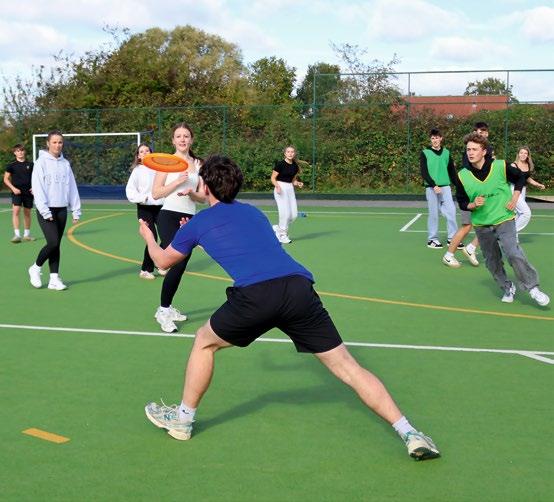
Physics
A-Level Pearson
Studying Physics means learning about the fundamental laws of nature that determine how everything in the entire universe works. From supermassive black holes, to subatomic virtual particles that pop in and out of existence, to a sleepy sloth hanging off a vine in the jungle – absolutely everything is made of matter, stores and transfers energy and interacts through forces.
If you have an enquiring mind, and enjoy asking why things happen – at the deepest level – then Physics will help you find the answers. Physics forms the basis of all modern technology and holds the future to global wellbeing.
Course Content
• Mechanics (motion, forces, energy and power)
• Materials (fluids, viscosity and material properties) Waves and the nature of light (incl. quantum physics)
• Circuits and electrical conductivity
• Nuclear physics (radioactive decay, fission and fusion)
• Thermal physics (radiative power, thermodynamics)
• Electric and magnetic fields
Particle physics (particle detectors and accelerators)
Circular motion, gravity and orbits
• Astrophysics and cosmology
Assessment
Three written exam papers, all taken at the end of the 2-year course.
Papers 1&2 will last 1hr 45mins and each only assesses half of the course content.
Paper 3 will last 2hr 30mins, will contain questions drawn from the entire course, and will have a particular focus on practical and experimental techniques.
You will engage in hands-on practical work and investigative/ experimental projects throughout the 2 year course. The exams assess your understanding of the practical and experimental techniques taught. Your ability to actually carry out experiments is assessed in a separate qualification called the Practical Endorsement. This is assessed by your teacher based on your performance during practical tasks throughout the course over the two years. The practical endorsement is reported on your final A-Level certificate alongside your A-Level grade, as either “Pass” or “Not reported”.
Career Possibilities
A-Level Physics is highly valued by employers and Higher Education providers as it demonstrates an ability to understand, analyse and manipulate complex quantitative information and numerical data. The skills and knowledge acquired during A-Level Physics is immediately applicable to further study or employment in:
• Scientific research and technical work
• Medicine and healthcare (A-Level Physics can be highly beneficial for medical applications)
• Engineering (mechanical, structural, electronic, communications, acoustic… all forms of engineering!)
• Established and emerging technologies Computing, ICT and web-based enterprise
• Computer programming and design
• Design, construction and architecture
• Geology, climate science, meteorology
• Finance, accountancy, logistics, economics and business
The energy industry
• Journalism, broadcasting, media, education
• Law (especially technical law)
GCSE Grade Profile
Grade 6-6 in GCSE Combined Science
OR a grade 6 in GCSE Physics
Grade 6 in GCSE Maths
Grade 5 in GCSE English
A-Level Pearson
This new qualification will help students to develop knowledge and understanding of the role politics plays in relation to current local, national, and global issues, as well as studying key thinkers and political ideas. The course reflects the demands of a truly modern and evolving political environment in the UK and around the world. Students will study UK politics and government to give them a core knowledge and understanding of the subject. Students will then develop this knowledge and understanding by studying four political ideas. They will also study the government and politics of the USA.
Course Content
• COMPONENT 1: UK Politics
Political Participation
The development of democracy and participation in UK
The role and scope development of UK political parties
The operation of the various electoral systems used across the UK
The way in which groups and individuals are influenced to vote
Core Political Ideas
This section allows students to explore the three traditional political ideas of Conservatism, Liberalism and Socialism.
• COMPONENT 2: UK Government
UK Government
The nature, sources and reform of the British constitution
The structure, role and powers of parliament
The power of the Prime Minister and executive
The relationships between the three branches of government
Optional Political Idea
This section allows students to explore the core ideas, principles, effects, divisions and key thinkers of the political idea of Anarchism.
• COMPONENT 3: Comparative Politics
USA
The US Constitution and the arguments surrounding this guiding document of US democracy
The power of the key institutions of government in the USA
The extent to which ‘liberty and justice has been achieved for all
The nature of democracy in the USA
Assessment
Each component is assessed with one two hour examination worth 33% of the qualification.
Career Possibilities
Many students who have taken the A-Level in Government and Politics go on to study Politics at university. From there you might become a researcher, join local or national government or even start on the path to become a future Prime Minister! But there are other job options too. If you fancy a career in journalism or the media, this course is very useful. Students also go on to become teachers or work in the legal profession.
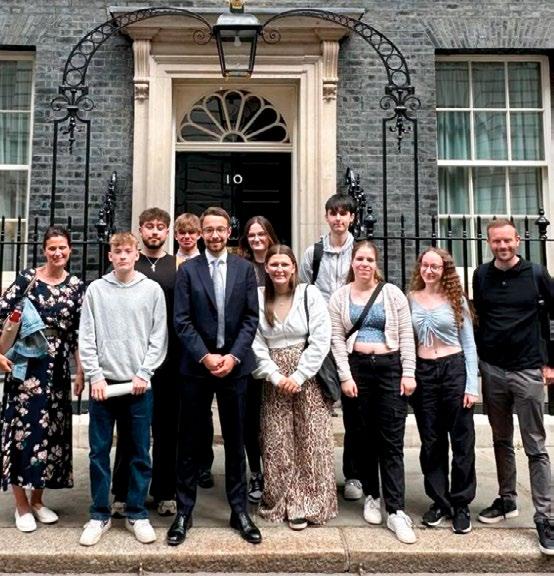
GCSE Grade Profile
Five GCSEs at grades 9-4
Grade 5 in English
Grade 5 in another humanities subject
Politics
Product Design
A-Level AQA
This course provides an exciting opportunity to gain the skills and qualifications required for a career in design. The world we live in is surrounded by design in many different forms. It may be the products we use or the buildings we live in. It could be the cars we drive or the clothes we wear. A career in design has so many variations and possibilities to explore. We aim to teach you the practical skills and technical knowledge to help you recognise the areas of design that are most suited to you.
Students will develop a knowledge and understanding of a wide range of materials and processes used in the field of design and technology. It is important for students, as designers, to learn about materials and processes so that they can develop a greater understanding of how products can be designed and manufactured. Students will also learn about industrial and commercial practices, and the importance of quality checks and the health and safety issues that must be considered.
Furthermore, students are expected to demonstrate their knowledge and understanding in design and practical areas. This will be realised through a coursework unit where a substantial design and make exercise must be developed through a portfolio and final practical outcome.
Course Content
• PAPER 1: Core Technical Principles (30% weighting, 2.5 hour written exam)
Students will develop their understanding and knowledge of materials and components, their properties and their applications regarding the life cycle of products, including manufacture, use and disposal. (This will be done through product analysis encompassing environmental sustainability, inclusive design and consumer safety.)
• PAPER 2: Designing and Making Principles (20% weighting, 1.5 hour written exam)
This involves looking at the work of designers and at manufacturing systems, technological developments and marketing and an understanding of the technical, economic, aesthetic, social, environmental, moral and ethical that surround the design process.
• NON EXAM ASSESSMENT: Practical Element (50% weighting)
Design and make unit (45 hours) where knowledge is applied to a brief. Students will produce a portfolio of research, design development and modelling, evaluation and a single practical outcome based upon the needs of a specific client.
Career Possibilities
An Advanced Level in Product Design would be good grounding in 3D design and materials/processes technology for anyone considering a for a degree in subjects such as 3D Design, Product Design, Automotive Design, Industrial Design, Architecture and Engineering. Alternatively you could choose to study for a Foundation Art course or It would also support students considering entry into employment in these and related areas.
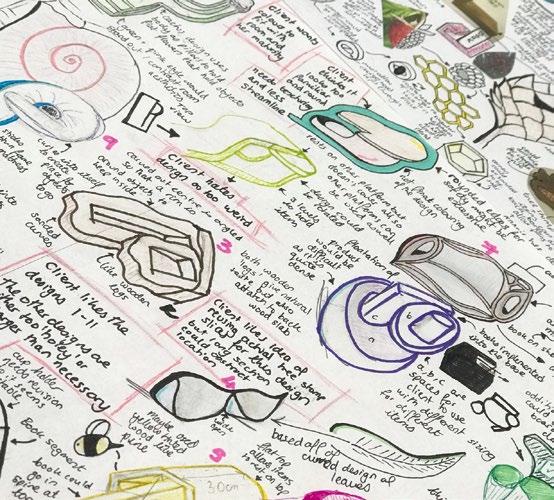
GCSE Grade Profile
Five GCSEs at grades 9 – 4 Grade 5 in GCSE Design & Technology, although students with a Grade 5 in Art will be considered.
A-Level AQA
Psychology is the scientific study of the mind and behaviour. It focuses on investigating key areas of human behaviour, including childcare issues, the nature of memory and mental illness. As well as engaging with a wide range of contemporary issues, you will also have the opportunity to develop your research, analysis and evaluation skills.
Course Content
• PAPER 1: Introductory Topic in Psychology (2 hour written exam)
Students will develop their knowledge and understanding of theories and studies in relation to Social Influence, Memory, Attachment and Clinical Psychology & Mental health.
• PAPER 2: Psychology in Context (2 hour written exam)
Students will develop their knowledge and understanding of theories and studies in relation to Approaches in Psychology, Biopsychology and Research Methods.
• PAPER 3: Issues and Options in Psychology (2 hour written exam)
Students will develop their knowledge and understanding of theories and studies in relation to the Issues and Debates that exist in Psychology, as well as the topics of Gender, Schizophrenia and Forensic Psychology.
All three of these papers will include a combination of multiple-choice, short answer and extended writing questions.
Career Possibilities
A-Level Psychology contains many transferable skills, which makes it a popular choice for both university entrance and employment. From healthcare and education to business and law, the intellectual and practical skills developed through Psychology opens doors to a diverse range of career paths.
Psychology students are highly valued for their skills in literacy, numeracy, analysis and research in a broad selection of careers. All university courses and a wide range of careers will appreciate the skills that studying Psychology develop in a student.
Psychology
GCSE Grade Profile
Five GCSEs at grades 9-4
Grade 5 in English
Grade 5 in another essay writing subject
Grade 4 in Maths
Grade 4 in Science
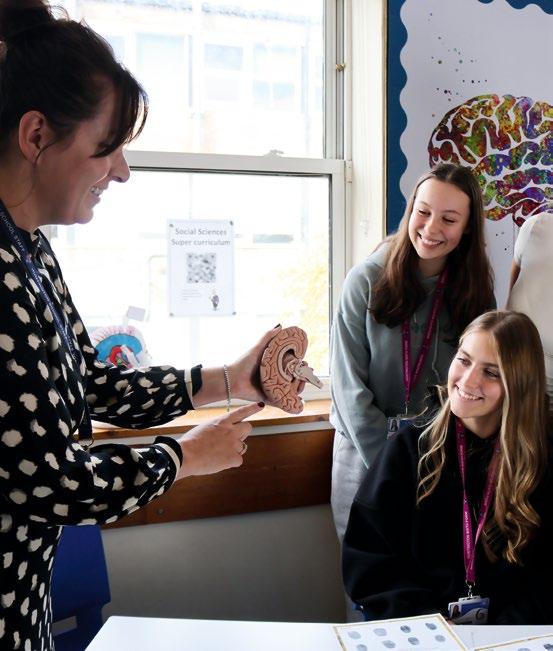
Religious Studies
By embarking on this course students begin a very challenging and academically rigorous investigation into some of humanity’s ultimate questions and concerns e.g. What is conscience? Is there a God? What is ‘good’? Do humans have a soul? Does the existence of evil and suffering serve a higher purpose? Whilst evaluating the contributions from some of the greatest philosophical, theological and ethical minds, students will embrace various desirable, transferable skills such as deep reflective questioning, document analysis, debate and discussion, essay writing and group contemplation.
Course Content
Philosophy of Religion (01)
Learners will study:
• Ancient philosophical influences
• The nature of the soul, mind and body Arguments about the existence or non-existence of God
• The nature and impact of religious experience
• The challenge for religious belief of the problem of evil
• Ideas about the nature of God
• Issues arising in religious language
Religion and Ethics (02)
Learners will study:
• Normative ethical theories
• The application of ethical theory to two contemporary issues of importance
Ethical language and thought
• Debates surrounding the significant idea of conscience
• Sexual ethics and the influence on ethical thought of developments in religious beliefs
Developments in Religious Thought (03)
Learners will study:
Religious beliefs, values and teachings, their interconnections and how they vary historically and in the contemporary world
Sources of religious wisdom and authority
• Practices which shape and express religious identity, and how these vary within a tradition
• Significant social and historical developments in theology and religious thought
• Key themes related to the relationship between religion and society
Career Possibilities
This course is an opportunity to look at a number of fundamental questions at the heart of human existence. Students who wish to go into spheres as diverse as medicine, the armed forces and law will find the ethical side of the course of immense benefit and application in the future. Jobs which include working with people, in any capacity, will gain from the study of philosophy. The skills of evaluation, deep contemplation and reflection will better equip learners for any university course and indeed for life in general.
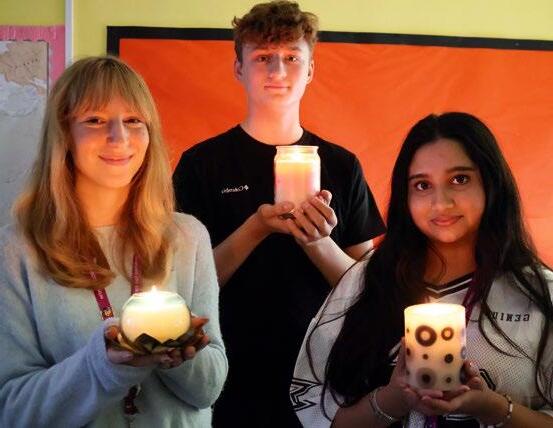
GCSE Grade Profile
Five GCSEs at grades 9-4
Grade 5 in English
Grade 5 in another Humanities subject (preferably Religious Studies).
A-Level AQA
This fascinating and enjoyable course leads to a greater awareness of the – relationship between society and the individual. Studying Sociology develops your understanding of the society we live in and how this is explained through a range of different perspectives. You will always be able to relate your own life experiences and current news events to the lesson content. This course fits in well with lots of other A-Level subjects, especially those that deal with people, social and political issues.
Course Content
UNIT 1: Education with Theory and Methods
• Education
• Methods in Context
Theory and Methods
UNIT 2: Topics in Sociology
• Families and Households
Beliefs in society
UNIT 3: Crime and Deviance with Theory and Methods
• Crime and Deviance
Sociological Theory and Methods
Assessment
• Each unit will have a 2 hour written exam (80 marks)
• Each unit represents 33.3% of A-Level
A range of short answers and 20- and 30- mark essays
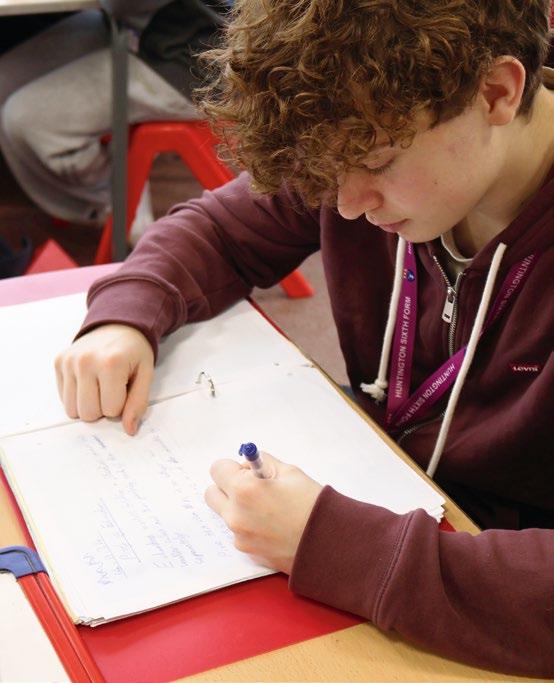
Career Possibilities
Sociology is an academic subject that requires you to develop a variety of transferable skills and leads to a wide range of careers which deal with people.
These may include; police, social work, nursing, teaching, law, the media or leads to careers making, carrying out or advising on social policy (especially in local authorities or the national Civil Service).
Sociology is also an excellent subject to support entry to a wide range of Higher education and university courses.
Sociology
GCSE Grade Profile
Five GCSEs at grades 9-4
Grade 5 in English
Grade 5 in another essay writing subject
Spanish
A-Level AQA
This is a stimulating and challenging course which aims to develop the student’s love of the Spanish language by using it to discuss aspects of modern day society and by analysing its grammar in greater depth than is possible at GCSE level. The skills assessed are the familiar ones of listening, speaking, reading and writing but lessons emphasise discussion and the development of students’ views and opinions. In addition to classroom lessons, students also have access to the Spanish Assistant and are encouraged to spend time abroad.
Course Content
Students study various aspects of society, culture and history in Spanish-speaking countries. These are grouped into four main themes.
• Changes in Spanish society
• Political and artistic culture in Spanishspeaking countries
• Immigration and multicultural Spanish society
• The Franco dictatorship and transition to democracy
In addition students will study a Spanish film in year 12 and a literary text in year 13.
At the end of year 13 students will be assessed on all aspects of the course by means of the following exams.
• UNIT 1: Listening and Reading (2 hour 30 minutes exam)
Students will be assessed in these skills across all of the four main themes studied over the two year course. They will also be tested on their ability to translate from Spanish into English.
• UNIT 2: Writing (2 hour exam)
Students will be assessed on their ability to criticise and analyse the film and book they have studied, and also to translate into Spanish.
• UNIT 3: Speaking (20 minute exam)
Students’ speaking abilities are assessed through discussion of one of the main themes and also their individual research project.
GCSE Grade Profile
Five GCSEs at grades 9-5
Grade 6 in Spanish
Career Possibilities
Foreign language skills are much sought after in the work place and an A-Level in Spanish is good preparation for any student entering employment in the 21st Century. Spanish is the second most-spoken native language in the world, after Mandarin Chinese, and the fourth most widely-used. It opens up opportunities in South America and across the world as well as in Europe.
At university Spanish can be studied either in combination with another language or with almost any other subject and leads to careers in sales, marketing, business, journalism, engineering, the civil service – in fact, in just about anything!

A-Level WJEC
If you have an interest in fashion design, interior design, fashion or interior styling, merchandising, fashion buying or journalism then this is a course to hone your talents and help create a pathway to further education within the subject. During the two-year Art Design Textiles A-Level, students will encounter a broad range of techniques and processes, and develop skills, ideas and experiences that support their creation of high quality textiles. Work produced on this course will demonstrate the use of creative skills to develop individual thoughts, feelings, observations and ideas within their projects.
The course will introduce students to all aspects of textiles work, which could include fashion, costume, digitally or traditionally printed and/or dyed fabrics, garments and materials, interior design, constructed textiles (knitted, woven, embellished or combined with other materials), textile installation and accessories.
Students will learn vital textile skills as well as studying the work of other textile artists to inspire their work. They will learn analytical skills in studying the work of others, as well as creating meaningful collections of their own. You do not require GCSE Textiles to take this course but an interest in Art and Textiles is important, as well as the creativity to combine and link textiles techniques and drawing.
Course Content
In year 12, we focus on a range of embellishing, colouring and structuring fabrics. We also study different approaches to fashion drawing. Some of the techniques include screen printing, lino printing and structural techniques include ruffles, heat shibori and fabric manipulation. We begin component 1 in the spring term of year 12.
• COMPONENT 1: Personal Investigation (60%)
Students are asked to choose a major project that has a personal significance. They must investigate artists and designers to inform their practical work. The investigation must include a personal study of between 1,000-3,000 words.
• COMPONENT 2: Externally set assignment (40%)
Students select a starting point from a release question paper. Responses are developed during the preparation study period. Students are given 15 hours of controlled time to work on developing their ideas to produce an outcome/product.
GCSE Grade Profile
Five GCSEs at grades 9 – 4
It would be advantageous to have studied Textiles or Art, but it is not essential.
Career Possibilities
An Advanced Level course in Art and Design Textiles is a widely recognised academic qualification. It can lead to Further and Higher Education in a wide variety of courses and to employment in research, fashion, construction, commerce and marketing within the textiles and clothing fields.
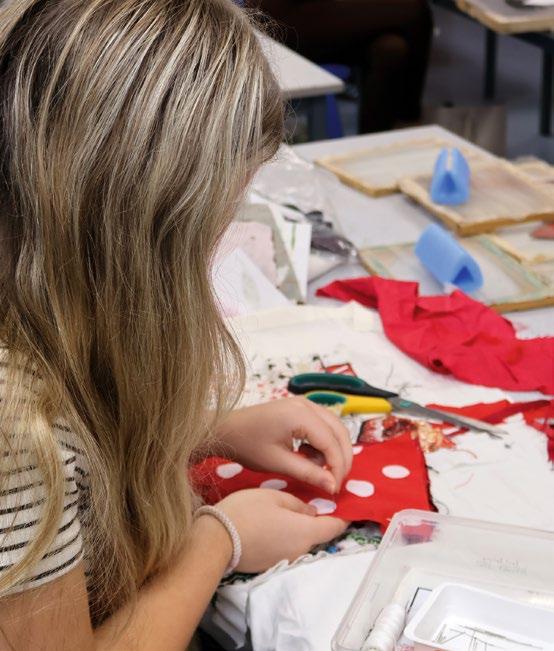
Textiles
Criminology
Criminology is an exciting course with elements of Psychology, Sociology and Law. Throughout this course you will explore the reasons why people commit crimes and consider the psychological and sociological theories of crime. You will examine how crime is perceived in society including the impact of the media and crime statistics. By understanding why a person commits a crime, you can then analyse approaches to reduce crime rates or successfully rehabilitate criminals.
The course provides you with opportunities to apply your knowledge and understanding to real life contexts related to the criminal justice system. It is recommended that you only study one of either Psychology or Sociology alongside this qualification.
Course Content
• UNIT 1: Changing awareness of crime
You will explore the wide range of different crimes including white collar crimes, moral crimes, state crime, individual crimes (e.g. domestic violence) and technological crimes. You will examine the reasons people have for not reporting such crimes and the consequences of these crimes going unreported.
You will also look at how the media represents crime to be able to recognise where common representations of crime may be misleading and inaccurate. This unit will conclude with you developing the knowledge and practical skills to plan and create your own campaign for change.
• UNIT 2: Criminological theories
You will gain an understanding of a range of sociological and psychological theories of crime and how these theories have been applied to helping create solutions to crime. You will also learn to support, challenge and evaluate expert opinion and be able to support your ideas with reliable and factual evidence.
• UNIT 3: Crime scene to courtroom
You will gain an understanding of the criminal justice system from the moment a crime has been identified to the verdict. You will develop an understanding of the rules regarding the collection of evidence from a crime scene and the rules of the trial process. At the end of this unit you will have gained the skills to review criminal cases, evaluating the evidence in the cases to determine whether the verdict is safe and just.
• UNIT 4: Crime and punishment
You will develop an understanding of the criminal justice system in England & Wales and how it operates to achieve social control. You will look at the roles of various organisations such as the Crown Prosecution Service, the police, prison and probation services and evaluate their effectiveness in controlling crime and protecting the public.
Assessment
Units 1 and 3 are internally assessed by controlled assessments. Units 2 and 4 are externally assessed by exams.
Career Possibilities
Criminology is an excellent preparation for anyone considering higher education at degree level in a wide range of related courses such as Law, Criminology, Social Policy, Criminal justice, Sociology or Psychology. There are also many career pathways involving the police, prison and probation services, criminal justice system, law and social policy.
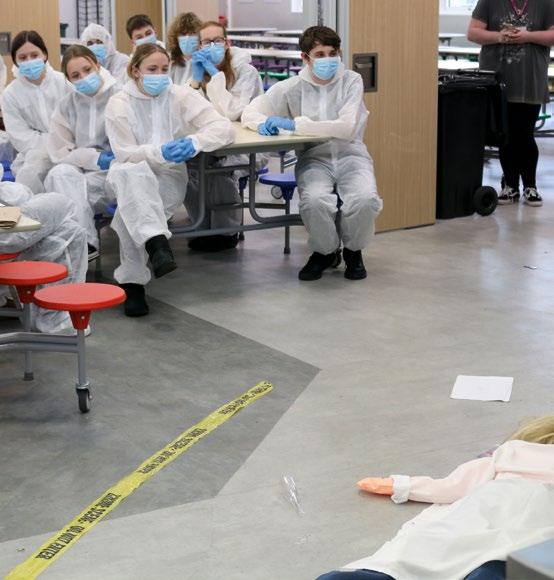
Level 3 OCR
New doors are opening in the world of media and communication. Cambridge Technicals are A-Level equivalent courses that have a more hands on approach to your studies. They are called vocational subjects that allow you to learn new skills, knowledge and understanding in real world situations. They are recognised by many universities and employers as giving you real world experience in the field of Digital Media.
The two year course begins with two core units. The first one being Media products and audiences where you will learn all about Social Media and the types of products that companies want to help promote their businesses.
The second unit is all about planning and the pre-production tasks that have to be done to create a successful Digital Media product. You will study the process of pre-production within the creative media industry.
In year 13 you will then create a media product that includes print and audiovisual components. This could mean creating Podcasts, vblogging or TV adverts while backing it up with a complete advertising campaign.
You will also complete a unit on Social Media and the globalisation of Digital Media. How Tweets, Likes, Insta’s can go viral around the world and how they generate income for you and the massive platforms behind them. The final unit is all about creating advertising products or how sound is used in Digital Media.
Course Content
Exams and Assessment
The qualification is a Cambridge Technical Extended Certificate in Digital Media. It is unit based throughout the 2 years. You complete units and your points are totalled up for your final grade. It is a mix of exams and coursework. This includes exams at the end of Year 12 so that you don’t have to worry about them all at the end of the course.
YEAR 1
UNIT 1: Media products and audiences (External exam)
• UNIT 2: Pre-production and planning (External exam)
YEAR 2
• Unit 3: Create a media product Unit 20 Advertising media
• Unit 21 Plan and deliver a pitch for a media product
• Unit 23 Create a social media profile
GCSE Grade Profile
Five GCSEs at grades 9-4
Grade 4 in ICT or Computer Science
Career Possibilities
This course gives you the opportunity to progress to a degree in an information technology discipline or a degree where design skills and knowledge may be advantageous. This course is suited to students who are aiming to work or study further Digital Media. The UK is requiring a massive increase in the number of people who understand how Social Media and other Digital Media resources can be used to grow their companies and industries. The grades are Pass, Merit, Distinction and Distinction*.

Digital Media
Enterprise and Entrepreneurship
Level 3 Certificate: Single Award Pearson
Enterprise and Entrepreneurship are important because it is the creation of new ventures that drive the economy, employment, growth and innovation across the UK. Entrepreneurs are those who take that first brave step, identify an opportunity and start their own enterprise. They have a clear vision and the determination to put their ideas into practice. We can all name a famous entrepreneur, but what is it that makes them so successful? What are the personal skills, qualities and characteristics that make them unique? Which attributes do they have that allow them to plan and run their enterprise?
This subject is designed to allow candidates to develop an understanding and appreciation of the factors that lead to successful entrepreneurs and enterprises. Areas of study include marketing, business and personal finance and entrepreneurs themselves. There are 2 internally assessed units, 1 set assignment and 1 written exam. This approach means students can showcase for future employers how they apply their learning to practical, everyday workplace challenges.
Course Content
The course comprises of four units; in year one students will learn about:
• Enterprise and Entrepreneurs (Internally assessed)
• Personal and Business Finance (Externally assessed)
In year two, students will cover: Developing a Marketing Campaign (Externally assessed) Social Enterprise (Internally assessed)
The course design allows students to put into practice in year two, the skills that they have learned in the first year and apply them in a practical context. Students will be required to set up and run their own social enterprise. The course allows students to work alongside local entrepreneurs and businesses and to develop strong academic and employability skills. Students who successfully complete the qualification will be able to progress to higher education, move into employment or an apprenticeship, or start their own business.
GCSE Grade Profile
Five GCSEs at grades 9-4
It is not necessary to have studied GCSE Business to access this course.
Career Possibilities
The Level 3 Extended Certificate is good preparation for students considering both Higher education and entry into work or apprenticeship. Employers rate highly the practical skills, knowledge, and experience developed by students. Many who study this qualification go straight into careers with large local employers or into trainee management positions with national companies. It will support entry to almost any HE course, depending on what the subjects taken alongside are, for example: BA (Hons) in Enterprise and Entrepreneurship
• BA (Hons) in Business Enterprise/Human Resource Management or Marketing
• BA (Hons) in Management and Enterprise.

Diploma: Double Award Pearson
The Pearson BTEC Level 3 National Diploma in Enterprise and Entrepreneurship is a two-year, full-time applied qualification equivalent to two A-Levels. It gives students the knowledge, understanding and skills needed to operate in the enterprise sector, whether starting their own business, working in small and medium enterprises, or progressing into higher education in business-related fields. The course combines practical enterprise activities with applied business knowledge, developing the entrepreneurial mindset and skills needed for future success.
Course Content
This qualification has 8 units, of which 6 are mandatory and 2 are optional. The mandatory units are a combination of internal, external and synoptic units.
• Mandatory external units:
Unit 2: Developing a Marketing Campaign
Unit 3: Personal and Business Finance
Unit 6: Business Decision Making
• Mandatory internal units:
Unit 13: Developing an Enterprise Strategy (synoptic)
Unit 1: Enterprise and Entrepreneurs
Unit 4: Launch and Run an Enterprise
• Optional units (choose two):
Unit 5: Survival and Growth
Unit 7: Social Enterprise
Unit 8: Entrepreneurship and Intrapreneurship in Practice
Unit 9: Innovation and Enterprises
Unit 10: Recruitment and Selection Process
Unit 11: Marketing Communications
• Assessment Structure
The qualification uses a combination of internal and external assessment, as well as a synoptic assessment.
Internal assessments: For the internally assessed units, centres set assignments that are assessed and quality-assured externally.
External assessments: Three units are externally assessed by Pearson under controlled conditions.
Unit 2: Task set and marked by Pearson (research + supervised assessment)
Unit 3: Written examination (2 hours)
Unit 6: Task set and marked by Pearson (3-hour supervised)
Synoptic assessment: Embedded in Unit 13 (Developing an Enterprise Strategy), where learners apply knowledge and skills from across the qualification.
Grades for units use Pass, Merit, Distinction and Near Pass scales.
Career Possibilities
By completing the Diploma, learners can progress to:
• Higher education in business, entrepreneurship or management
• Higher apprenticeships in business, marketing or enterprise roles
• Employment in small or medium enterprises or in roles requiring entrepreneurial skills
• Launching their own business or becoming self-employed

GCSE Grade Profile
5 GCSEs at grades 9–4, including Maths and English Language
Enterprise and Entrepreneurship
Food Science & Nutrition
The Level 3 Food Science and Nutrition qualification is an academic, creative and innovative course that encourages students to take a broad view of food science and nutrition. It is ideal for students with a strong interest in the science behind food production, dietary health and broader impact on nutrition and well-being. The course provides students with an in-depth understanding of key topics such as food safety, the role of nutrients in the body and the development of innovative food products. The qualification has been designed around the concept of a ‘plan, do, review’ approach to learning. The course includes a high practical input. The course prepares students for the demands of higher education, equipping them with research, analytical and practical skills that will benefit them in university and beyond.
Course Content
Learners complete two units for the Certificate and an additional two units for the Extended Certificate.
YEAR 12 UNITS (Certificate)
• UNIT 1: Nutritional Needs Across Life Stages (Exam – 1 hour and 30 minutes )
This unit develops knowledge and understanding of food and nutrition across the life stages. Students will understand why a range of individuals have different nutritional needs and how these can be met.
• UNIT 2: Developing Practical Food Production Skills (Non-examination assessment – 11 hours and 30 minutes)
This unit develops practical skills and knowledge and understanding of food choice and nutrition. Students will plan, prepare, cook and present food items to meet the needs of a specific target audience. Students will produce a coursework project including both in-depth theoretical study and practical outcomes.
YEAR 13 UNITS (Extended Certificate)
• UNIT 3: Principles of Food Hygiene and Food Safety in Food Production. (Exam – 1 hour and 30 minutes)
In this unit students will develop an understanding of hazards and risks in relation to the storage, preparation, cooking and serving of food items in different environments and the control measures needed to minimise these risks.
• UNIT 4: Experimenting to Solve Food Production Problems (Non-examination assessment – 12 hours)
This unit allows students to understand the scientific properties of food to allow for planning and carrying out experimental work. The results of the experiments will be used to solve food production problems.
Assessment
The course is assessed through a combination of written examinations (50%) and non-examined assessment (50%) catering for different learning styles. The grading is reported on an A-E grading scale.
Career Possibilities
The Food Industry continues to expand and is one of the largest employers in the UK. The Level 3 Food Science and Nutrition Certificate qualification will be of particular interest to students who intend to progress to higher education and pursue careers in areas such as dietetics, food science, nutrition consultancy, public health, food manufacture, marketing or food product development.

GCSE Grade Profile
Five GCSEs at grades 9-4
Grade 4 in Food Preparation and Nutrition helpful
Grade 5 in science
Level 3 OCR
The CAAQ Extended Certificate is equivalent in size to one A-Level. It is intended to be taken alongside A-Levels or other Level 3 qualifications as part of a broader Key Stage 5 study programme. This helps students develop a wider range of knowledge and skills valued in higher education and relevant to progression into university. The qualification consists of six individual units, assessed either through external examinations or through internally assessed, externally moderated Non-Exam Assessments (NEAs). Of these six units, two are externally examined and four are NEAs, with two mandatory units that all students must complete. It has been designed in collaboration with experts spanning the breadth of the sector and focuses on the skills, knowledge and understanding that today’s universities and employers demand. Students will practically apply their skills and knowledge in preparation for further study or the workplace.
Course Content
UNIT 1 Principles of health and social care
(Externally assessed exam)
In this unit, you will explore the core concepts and foundational knowledge that are essential in health and social care settings. You’ll examine legal frameworks, safety procedures, and best practices that support high-quality care.
Topics include:
• Topic Area 1: Equality, diversity, and rights in health and social care settings
• Topic Area 2: Managing hazards, health and safety in health and social care settings
• Topic Area 3: Legislation in health and social care settings
• Topic Area 4: Best practice in health and social care settings
UNIT 2: Supporting People with Mental Health Conditions
(Externally moderated NEA unit)
In this unit, you will explore what mental health means, how it’s perceived, and how different conditions can affect individuals’ lives. You’ll consider the support available to promote mental wellbeing, manage conditions, and understand the roles of services and treatments in supporting mental health.
Topics include:
• Topic Area 1: Definitions and views of mental health
• Topic Area 2: Mental health conditions
Topic Area 3: Provision of mental health services
• Topic Area 4: Treatment and support for mental health conditions
UNIT 3: Person-Centred Approach to Care
(Externally moderated NEA unit)
This unit focuses on the values and principles behind person-centred care. You’ll learn practical methods for developing personalised care plans, communicating effectively, building professional relationships, and addressing potential barriers. You’ll also develop skills in reflective practice.
Topics include:
• Topic Area 1: Taking a person-centred approach
• Topic Area 2: Meeting needs and providing support in a person-centred way
• Topic Area 3: Communication skills needed to offer person-centred care
Career Possibilities
Health and Social Care is an excellent preparation for anyone considering higher education at degree or diploma level in a wide range of related courses such as Nursing, Social Policy, Social Studies, Sociology, Psychology, Childcare, Paediatrics, Midwifery, Social Work, Police Officer, Probation Officer, YOTs, Paramedics, Health Visitor, Counselling and Teaching. Alternatively, students may move directly into employment where they may continue to gain qualifications.
GCSE Grade Profile
Five GCSEs at grades 9-4
Grade 5 in English
Grade 4 in Science
Previous knowledge of Health and Social Care is not required.
Health and Social Care
Medical Science
Level 3 Pearson
This could appeals to those who have a keen interest in the application of science, particularly in medicine. It suits learners who want to find out more about science through personal investigations, as the course enables lots of opportunities to carry out practical work and research. All external exams are available to re-sit if required to achieve an overall higher grade.
Course Content
To be covered over the two years.
• UNIT 1: Compulsory External Exam
The format is a mixture of lower demand 1 or 2 mark questions that test a student’s ability to recall correctly the specification and longer high demand 9 mark questions that demonstrate a deeper understanding of the topics studied and the ability to link ideas together.
The content covers how the human body works, in good and poor health, at a cellular and tissue level. You will study the nervous, endocrine, musculoskeletal, cardiovascular, respiratory, renal and digestive systems – and gain some insight into how these systems interrelate. This unit will give you a foundation for biological study in medical science, as you will gain knowledge of how the human body functions.
• UNIT 2: Compulsory External Exam
The format is 1-3 mark questions based on the core content followed by a section based on a scientific article or journal on one of the techniques, so acts like a comprehension, and assesses the student’s ability to analyse and evaluate the data given and statements made in the article/journal, hence containing a higher demand style of question worth 6-9 marks.
In this unit, you will explore several key areas in the field of medical science, with a focus on health issues faced by the human population today to explore their impact on the world we live in. You will gain an understanding of diagnostic techniques (e.g. ECG and genetic screening), before focusing on health issues themselves alongside associated initiatives.
• UNIT 3: Compulsory Coursework
You will investigate the effect of antimicrobial agents on the growth of microorganisms, by selecting and applying knowledge of microorganisms and infectious diseases. You will draw on your wider scientific understanding and skills to independently plan and carry out a range of practical techniques. You should develop an understanding of the nature of microorganisms and be able to appreciate the various methods available to treat or cure diseases.
Optional Unit Coursework (one from the below)
• UNIT 4: Diseases, Disorders, Treatments & Therapies
Students will explore biological molecules and pathways, and their relevance to diseases, disorders, treatments and therapies. This unit gives them theoretical knowledge of diseases and disorders, an insight into current and future treatments, and knowledge of how biology is applied to make a positive impact on our lives.
• UNIT 5: Biomedical Science Level: 3
This unit will help students understand the role biomedical scientists play in identifying the causes of disease and in helping medical personnel to offer suitable treatments. You will study the three key areas of biomedical science: haematology, health screening, histology/cytology, and urinalysis.
• UNIT 6: Human Reproduction and Fertility
Students will gain an understanding of human reproduction and its control by hormones, and they will examine causes of infertility and possible treatments. The focus is on human reproduction, its control mechanisms and associated fertility problems.
Career Possibilities
Due to the research and analysis nature of the tasks during this course the skills you will gain will be relevant to a range of university courses/ apprenticeships/jobs. The development of the subjects studied during this course would lead to university courses such as physiotherapy, sport science, nursing, midwifery, psychology and biomedicine.
GCSE Grade Profile
Five GCSEs at grades 9-4
Grade 4-4 in Combined Science (Triology) OR a Grade 4 in Chemistry, Biology and Physics.
Grade 4 in English and Maths. Please note, if progressing to university in this field, some courses require grade 5 in these subjects.

Field trips

Expeditions

Ski trip
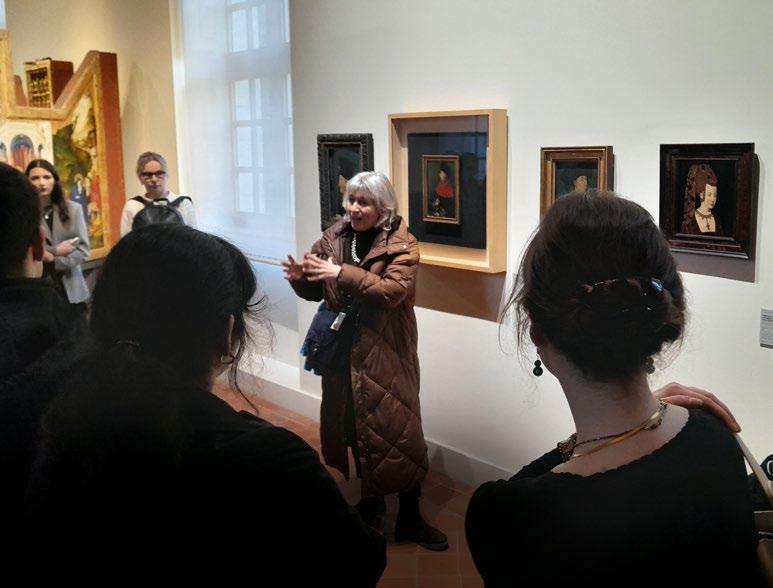
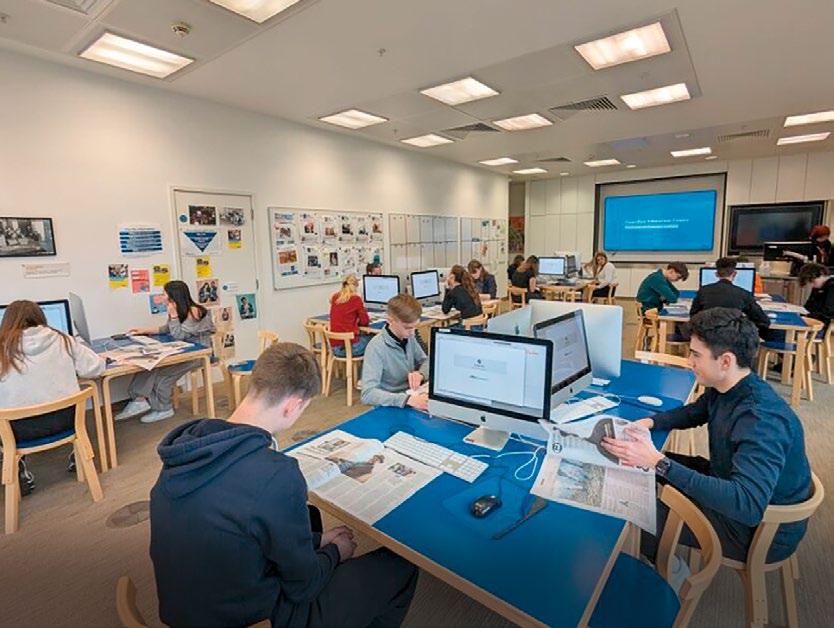
Workplace visits

Enrichment
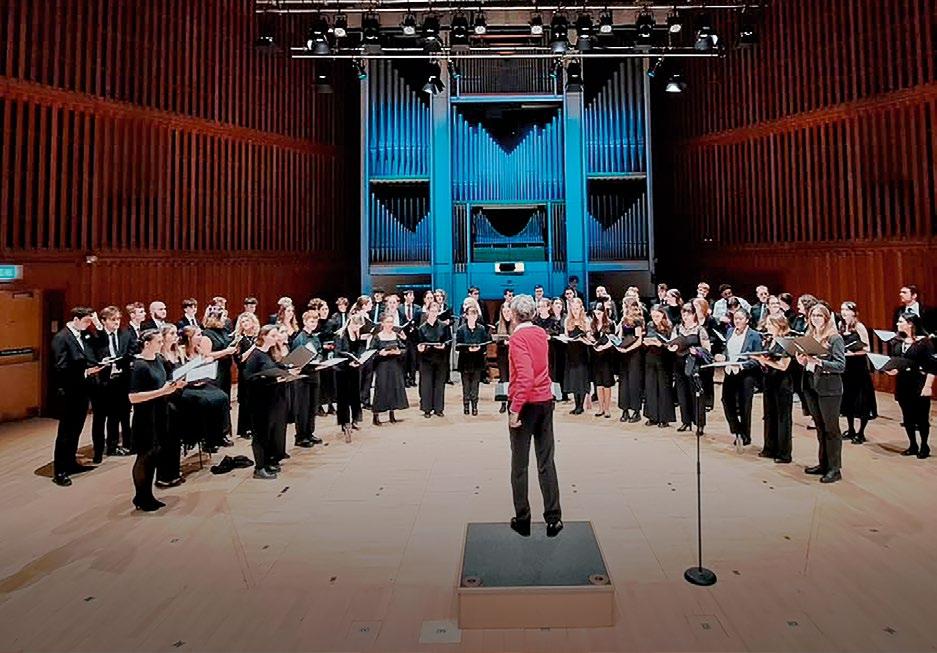
How to apply
To apply to Huntington Sixth Form, please complete an application form on our website by the date specified on the form. You will hear soon after if we are able to offer you a place.
Our option block system at Huntington Sixth Form is based upon student choice. If you apply before the deadline, you will influence what subjects are available to study alongside each other. Please note however, that in rare instances students are unable to do their first-choice course combination as the option blocks are dependent upon student demand. Occasionally, therefore we will need to discuss options further, this will be indicated to you when write to you following your application.
Offers of places at Huntington Sixth Form are conditional on a student meeting the minimum entry requirements for the Sixth Form and for the courses chosen. These requirements can be found in the subject pages. Please pay close attention to these requirements when applying.
Our Open Evening and Taster Day provide opportunities to find out more about the Sixth Form it’s very important to visit the school, meet us and talk to us. If you are currently at another school, you are very welcome to visit the school with your parents for an individual tour and a discussion with Mr Richards, Director of Sixth Form.


Huntington School
Huntington Road, York YO30 9WT
mail@huntington-ed.org.uk
01904 752100
www.huntingtonschool.co.uk
